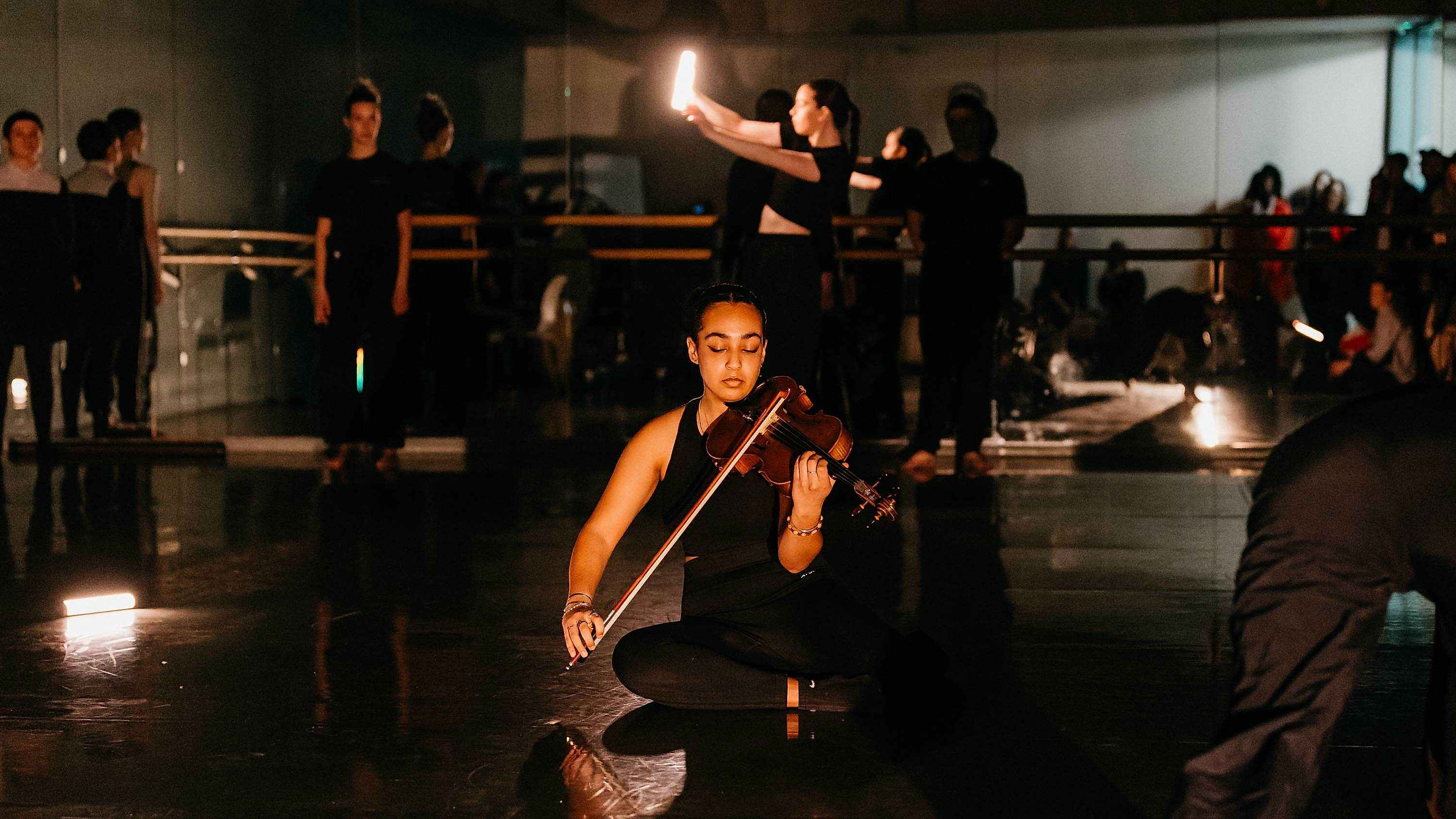
Research Degree Programme
Course details
Introduction
Do you want to lead the conversation in the world of performing arts research? Trinity Laban offers the MPhil and PhD research degrees, validated by City St Georges, University of London.
The Research Degree Programme leads to one of the following awards:
MPhil / PhD in Creative Practice: [Dance / Music / Collaborative Arts]
MPhil / PhD in [Dance and / or Music] Science
MPhil / PhD in [Dance and / or Music] Pedagogy
Key Features
The Research Degree Programme includes an induction period, research skills training, seminars, and a requirement to present your research work on a regular basis. You will mainly focus on regular one-to-one supervisions with two allocated research members of Trinity Laban staff or one member of Trinity Laban staff and one supervisor from a different institution.
The options in creative practice are suitable if your main focus is in musical composition, choreography, music and dance performance, movement-based somatic practice, or other projects in art forms such as film, installation, and photography that interface substantially with either music or dance. Any related activity which embodies practical components, including research incorporating interdisciplinary collaborations, is also suitable. Historical research projects that use archive resources at Trinity Laban are also admissible under this option.
The options in science and pedagogy are available if you are specialising in empirical approaches to topics in music and / or dance research and if you wish to concentrate on educational and pedagogical aspects.
Some researchers combine practice with theoretical perspectives – for example, looking at the cultural context of the creation and performance of works. Practitioners and researchers from Trinity Laban are developing innovative, collaborative projects which push the boundaries of the art forms and promote the development of new artistic media.
Key Facts
- UCAS
- 900F (full time), 900P (part time)
- Location
- Laban Building / King Charles Court
- Duration
- 4 years (full time) / 7 years (part time)
- Start Date
- January or September
Fees
Audition fees
Please note that there is no audition fee for this course. You will only need to pay the UCAS Conservatoires administration fee of £28.50 for the 2025 entry cycle.
2025-26
- Info 25/26
- Fees represent 2025/26 year only, programmes with more than one year are subject to fee increases after the first year
- Research Degree Programme (MPhil/PhD) (Full time)
- Home £7,550 International £16490 Writing-up £2,790
- Research Degree Programme (MPhil/PhD) (Part time)
- Home £4,440 International £9,810 Writing-up £2790
2026-27
- Info 26/27
- Fees represent 2026/27 year only, programmes with more than one year are subject to fee increases after the first year.
- Research Degree Programme (MPhil/PhD) (Full time)
- Home £7,850 International £17,150 Writing-up £2,900
- Research Degree Programme (MPhil/PhD) (Part time)
- Home £4,620 International £10,200 Writing-up £2,900
2023-24
- Research Degree Programme
Key Dates
Submission deadline, September intake
Submission deadline, January intake
Detailed Information
Initial registration for research degree candidates is usually for a Master of Philosophy (MPhil) course, allowing you time to develop your research methodology and refine your topic. The projects will be assessed after an initial period, at which time transfers to the PhD course may be considered.
Registration can be either in full-time or part-time mode, and there are two intakes for the Research Degree Programme in each academic year: January and September. We also offer options for suitably experienced staff candidates to pursue doctoral study, and in appropriate cases, submission by prior publication is possible.
Recent research by Trinity Laban staff has been funded by awards from The Leverhulme Trust, The Wellcome Trust, the Arts and Humanities Research Council, National Endowment for Science, Technology and the Arts, and Arts Council England. An ambitious boost to research activity introduced a number of appointments at Reader and Professor level which led to the conservatoire submitting to the REF 2014 (Research Excellence Framework), the first such submission for Trinity Laban, and more recently to REF 2021.
The MPhil and PhD programmes are led by Professor Jonathan Owen Clark, Head of Research and Knowledge Exchange (RDPAdmissions@psychraph.online).
Prof Clark welcomes informal enquiries relating to any aspect of potential postgraduate level research at Trinity Laban. If you are considering contacting us or submitting a formal application, please read the Guidance Notes for RDP Applicants before you do so. The Guidance provides detailed information on the above and many additional aspects of the Research Degree Programme and the application process.
For further information, read the Trinity Laban Research Degree Programme Student Handbook (in Downloads section).
Supervision
At Trinity Laban, the guideline supervisory contact hours for full-time research students is based on a student / supervisor meeting of two hours once a month (24 hours / Academic Year shared between supervisors). If you are a part-time Research Degree Programme student, you will therefore receive a supervisory meeting of two hours, once every two months (12 hours / Academic Year shared between supervisors).
The number and frequency of meetings is expected to change during an individual’s course of study (it may be the case that more supervision is required at the beginning, and less at the end).
It is expected that the role of ‘first’ or ‘main’ supervisors and second supervisors be flexible and designed in consultation with all parties; as is the ‘split’ of supervisory meetings between supervisors. All students and supervisors are required to keep notes of the content of all designated supervisory sessions that are shared after each meeting. These notes form the basis of the supervisors’ annual written review for each student.
Supervisory support during the ‘writing up’ period is halved and stipulated to be 12 hours in total for full-time students (pro-rata for part-time students). It is halved again during an amendment period post-viva voce.
Research development
Our research students have access to an annual programme of Professional Development events which are organised in two strands:
The Researcher Development Series, with sessions on a wide variety of subjects, from diversity to planning and managing your research project.
Professional Development for Research Students with presentations designed to help with specific milestones, which are part of MPhil / PhD students’ progression towards submission.
During the annual RDP / MFA Week, you’ll present your work in progress through talks open to all our staff, students, and external visitors.
The Parallax series of staff and student showcases is an opportunity for Creative Practice students to apply to stage a performance or presentation of their work.
Our Research Seminar Series takes place on occasional Wednesdays and is an opportunity to hear invited researchers speak about an aspect of their work.
The Preparing to Teach course, delivered through two workshops during the year, is part of TL: Augment, our Professional Development programme that has been accredited by Advance HE. It is designed specifically for Research Degree Programme students, who should attend to develop their understanding of teaching within Higher Education and prepare for potential opportunities to contribute to curriculum delivery at Trinity Laban.
Please contact the Research Administrator if you would like further information on any of the above.
Find out more about our Research Events here.
Assessment
All candidates present a written dissertation for examination. This may take the form of a combination of practice and / or practical documentation, in addition to a written document. Wholly written submissions – for example, in music / dance science or historical projects – are also appropriate.
For details of word-counts and submission materials, please see the Trinity Laban Research Degree Programme Handbook.
Entry Requirements
You can find a brief outline of prerequisites for an application and its necessary components below. Please note that this list is not exhaustive and that you should read the Guidance Notes for RDP Applicants carefully before you consider submitting an application.
- A good Honours degree in a relevant subject and, preferably, a master’s qualification, or equivalent qualifications.
- You are required to submit a detailed research proposal, which outlines the area(s) of study and a description of how these correlate with existing areas of scholarship, both theoretical and practical. You will also be asked to state how the proposed research project is represented in terms of the research interests of Trinity Laban, and, if necessary, how the resources of the conservatoire will be utilised.
- If your first language is not English, you must also have sufficient command of English to study at doctoral level: an IELTS (Academic) score of 6.5 or above in each element. Please note that applications which should include an IELTS certificate cannot be assessed if they are submitted without it.
Your application will consist of both an application via UCAS Conservatoires and also additional information to be submitted via Embark:
An outline research proposal
A summary CV
Certified copies of all degree certificates
A copy of English Language certification (if required)
For proposals engaging in practical elements, a portfolio of your creative practice.
Please contact Admissions (admissions@psychraph.online) with any application queries.
Research Degree Programme supervisors
Core supervisory team

Dr James Brouner
Lecturer in Dance Science
Learn about Dr James Brouner
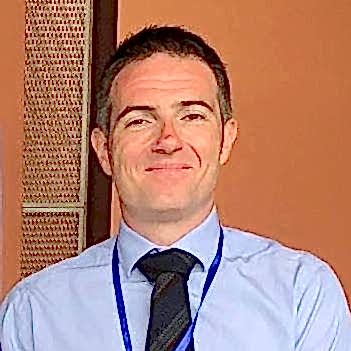
Dr James Brouner
James is an experienced Senior Lecturer with a demonstrated history of working in the higher education industry. James works for Kingston University as the course director for the Sport Science BSc (Hons) programme. He has been at Laban since 2014 teaching biomechanical and movement analysis. James delivers lectures on the MSc Dance Science programme and has supervised a number of MSc projects across biomechanics for performance enhancement and injury prevention. He has presented work at both IADMS and PAMA.
Research interests and areas of supervision:
- Performance analysis
- Biomechanics
- Nutrition
- Dance Science
- Performance science
Biography
Qualifications:
- PhD entitled Biomechanical analysis of the impact of fatigue on the Dorsi flexors and Plantarflexors
- MSc in Applied Sport Science
- BSc (Hons) Sport Science
- Post Graduate Certificate in Teaching and Learning in HE (PG-CertHE)
Teaching Experience:
- Senior lecturer and course director, Sports Analysis and Coaching, Kingston University.
- Senior laboratory technician, Kingston University.
Outputs:
Howatson, G., Goodall, S., Hill, J., Brouner, J., Gaze, D., McHugh, M. P., Shave, R. (2011). The influence of dietary antioxidant supplementation on exercise-induced cardiac troponin release. International Journal of Cardiology, 152 (1), 101 – 102
Howatson, G., McHugh, M.P., Hill, J., Brouner, J., Jewell, A., van Someren, K.A., and Shave, R. Howatson, S.A. (2010). The effects of a tart cherry juice supplement on muscle damage, inflammation, oxidative stress and recovery following Marathon running. Scandinavian Journal of Medicine and Science in Sports, 20, 843-52.
Howatson, G., McHugh, M. P., Hill, J. A., Brouner, J., Jewell, A. P., van Someren, K. A., Shave, R. E. and Howatson, S. A. (2009). Influence of Tart Cherry Juice on Indices of recovery Following Marathon Running, Scandinavian Journal of Medicine & Science in Sports, 19(5) 975 – 979
Howatson, G.; Glaister, M.; Brouner, J.; van Someren, K. A. (2009). The reliability of electromechanical delay and torque during isometric and concentric isokinetic contractions, Journal of Electromyography and Kinesiology, 19(5) 975-979

Dr Dave Camlin
Professorial Staff - Academic Studies
Learn about Dr Dave Camlin
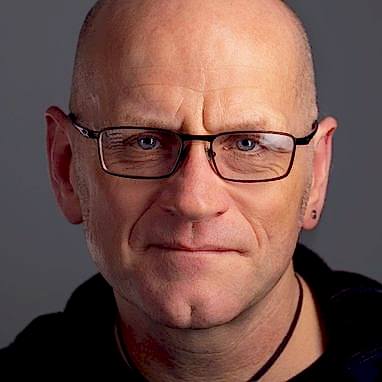
Dr Dave Camlin
Lecturer in Music Education, Programme Coordinator
MEd Music Education (online)
Dave Camlin joined Trinity Laban in 2014 as a Lecturer in Music Education. He coordinates the MEd Music Education (online) programme, and leads a number of modules at Masters level.
Research Interests
- Community music
- Group singing
- Music, health and wellbeing
- Music making and social ecology / sustainability
- Musician education
Biography
Dr. Dave Camlin is an award-winning musician from Cumbria (UK) whose practice spans performance, composition, teaching, community music and research. His research interests include: community music, especially group singing; music, health and wellbeing; musician education. He has pioneered the use of Sensemaker® ‘distributed ethnography’ as a research method for understanding artistic and cultural experiences. His recent book Music Making and Civic Imagination explores the potential of music making as both a complex adaptive system (CAS) and a global resource for sustainability.

Dr Emilie Capulet
Programme Leader - BMus (Hons) and Foundation
Learn about Dr Emilie Capulet
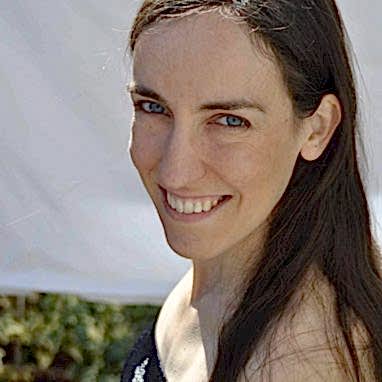
Dr Emilie Capulet
Dr Emilie Capulet is an award-winning pianist, lecturer and musicologist with a unique and versatile interdisciplinary background that crosses over from music to literature, and from historical enquiry to innovative multimedia performance. As a lecture-recitalist, accompanist and chamber musician, she has a portfolio of national and international performances in the UK, Europe, Latin America, the USA, Canada and Asia.
Research interests and areas of supervision:
- Performance
- Musicology
- Relation between music and literature
Biography
She has led knowledge exchange and public engagement music projects with international cultural and educational organisations such as the Alliance Française, Glyndebourne, ACE Cultural Tours, the Casa de los Tres Mundos (Nicaragua), and Rivages du Monde and she has recently given performance masterclasses and lectures at the Xinghai Conservatory of Music in Guanzhou (China), the Hong Kong Baptist University, the Sorbonne University in Paris and the Liszt Academy in Budapest. While touring Latin America, she received the ExpressArte award for her exceptional contribution to Nicaraguan culture, art and education. Her involvement in emerging impact contexts within the wider healthcare community has led to performances in hospitals for BreatheArts Health Research (St Thomas’ and Guy’s Hospitals), at the Royal Hospital for Neuro-disability, and in dementia care.
As well as mainstream repertoire, Emilie is also an advocate for contemporary music, marginalised artistic voices and cross-art collaborations and has recently released the premiere recording of Richard Lambert’s solo piano, chamber music and song cycles on the Quartz label, as well as the first recording of the complete solo piano music of the French-Corsican composer Henri Tomasi (1901-1971) on the Calliope label, which was awarded a ‘Grand Frisson’ by Audiophile Magazine and ffff in Pizzicato Magazine. She has also recorded Beethoven and Chopin for BNP. She has been broadcast on BBC Radio 3, Radio Canada, France Musique, Radio Télévision Suisse, Bayern Klassik, and Nicaraguan television and radio and has appeared live on Sky News as their classical music expert.
Emilie has extensive experience in Higher Education in both conservatoire and university settings. She holds a dual French Doctorate and British PhD on musical forms and aesthetics in the works of Virginia Woolf as well as a Master of Music in Performance from the Guildhall School of Music and Drama and an MA on Shakespeare from the Université de Provence. Emilie is committed to enhancing the student experience by bringing together theory and practice in order to create an inclusive and interdisciplinary curriculum, leading students to rethink the way we approach the histories and contexts of music performance today. By encouraging students to explore a network of often tacit or embodied knowledge, and to critically appraise the cultural, mythopoetic, social and political contexts of music composition and performance, Emilie encourages meaningful and engaged musical performances in order to open up new possibilities in creative artistic practices.
Undertaking ground-breaking interdisciplinary research at the interface of historical enquiry, musicology, performance and intermedial/transmedial cultural studies, Emilie has published her research in peer-reviewed journals and books. One of her recent interdisciplinary and collaborative projects on hyper-production addressed issues in musical ontology by following a practice-centered research approach and by exploring creative contemporary interpretations and reconfigurations of historical musical texts, including works by Haydn, Schubert, Chopin, Franck, Debussy and Ravel. Through non-linear editing, 3D spatial staging, immersive audio experience, and digital signal processing, the interdisciplinary and collaborative research team produced technologically mediated performances for which they received funding by the Arts and Humanities Research Council. She is currently the recipient of a prestigious Leverhulme Research Fellowship for a project centering on the French-Corsican composer Henri Tomasi (1901-1971), exploring the construction of cultural identity, music and political engagement, issues in auto-/biographical writing, and an assessment of diversity, class, legacy and knowledge production in Western classical music. She is a member of the Peer Review College of the Arts and Humanities Research Council.

Professor Jonathan Owen Clark
Head of Research and Knowledge Exchange, Professor of Aesthetics and Arts Practice
Learn about Professor Jonathan Owen Clark
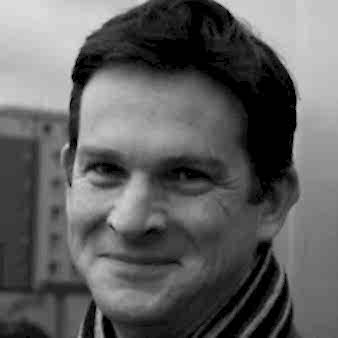
Professor Jonathan Owen Clark
Dr Jonathan Owen Clark is Head of Research and Knowledge Exhange at Trinity Laban. Areas of specialization include: Philosophical Aesthetics; Critical Theory and Historiography; Musicology and Dance Studies; Mathematical Music Theory; Musical Composition and Sound Design; Inter-Arts Collaborative Practice and Installation Art.
* Conferred with the title of Professor in January 2017.
Research interests and areas of supervision:
- Critical theory
- Arts practice
- Critical theory and historiography
- Philosophical aesthetics
- Musicology and performance studies
- Critical pedagogy and participatory arts
- Mathematical music theory
- Musical composition and sound design
- Inter-arts collaborative practice and installation art
Biography
Currently supervising PhD students on the following topics: Musical Composition (x2); Politics and Aesthetics; Musical Historiography; Movement Intervention and Architecture; Ontology of Motion-Depicting Photography; Geometry, Enaction and Choreographic Praxis; Contemporary Music and Curating.
At PGT and UG Level, modules taught include: Music Historiography; Philosophy of Music; Music and Perception; Art and Phenomenology; 19th and 20th Century Music; Popular Music; Generative Computer Music; Max/MSP Programming; Elektronische Musik and Musique Concréte.
Residencies and Awards:
Residency, Bloomberg SPACE, London (2011); Visiting Lecturer, Conservatorio di Musica, Perugia (2008); Visiting Research Fellow, Simon Fraser University, Vancouver (2003, 2005); Residency at Bluecoat, Liverpool (2001); Residency at the Banff Centre for the Arts, Canada (2000); Instrumental Scholar, Magdalen College Oxford (1990-1993).

Dr Christina Guillaumier
Reader in Music & Cultural Practice
Learn about Dr Christina Guillaumier
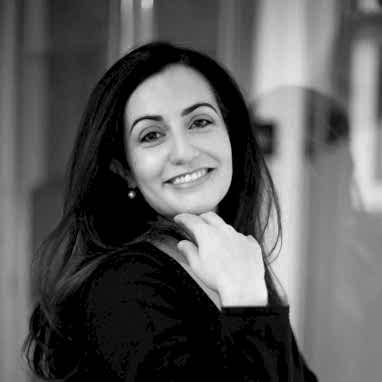
Dr Christina Guillaumier
Christina Guillaumier is a historical musicologist and pianist based at Trinity Laban where she serves as Reader in Music & Cultural Practice.
Research interests/ areas of supervision:
• Slavic and East European music
• opera
• piano repertoire & pedagogy
• genetic criticism and music editing
• conservatoire training
• classical music industry
Biography
Known for her insightful work as a writer, teacher, and broadcaster, she engages international audiences across music, the arts, and education, publishing in multiple languages. With nearly two decades of experience in higher music education across the UK and Europe, Dr Guillaumier is widely recognised for her leadership in curriculum development, academic strategy, and digital learning. She previously served as Head of Undergraduate Programmes at the Royal College of Music and as Head of Contextual Studies at the Royal Conservatoire of Scotland.
Dr Guillaumier is a Fellow of the Royal Society of Arts (FRSA) and a Senior Fellow of the Higher Education Academy (SFHEA). She is also an editor at Bärenreiter, specialising in critical editions of piano music. Her most recent publication, a critically acclaimed biography of Sergei Prokofiev with Reaktion Press, reflects her expertise in Russian music. She co-convenes the Slavonic and East European Music Study Group and holds visiting roles with institutions internationally. She is also an active peer reviewer for academic journals and publishers.
Her research focuses on two interrelated areas: music history and cultural practice; and conservatoire training, pedagogy, and artistic research. She has held fellowships and research appointments at Princeton University, the Paul Sacher Foundation in Basel and the Royal College of Music. Her work has been supported by the AHRC, European Union, Erasmus, American Musicological Society, and others.

Dr Guy Harries
Professorial staff - Composition
Learn about Dr Guy Harries
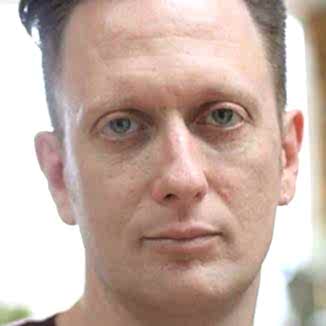
Dr Guy Harries
Guy Harries is a composer, sound artist and performer, working with electronics, acoustic instruments, voice and multimedia. His research explores the use of live electronics in music with a focus on dramaturgy, the performative and audience participation. His music releases include solo work and collaborations with the POW Ensemble, Meira Asher and Yumi Hara on the labels X-OR, Sub Rosa, Editorium Edizioni and Migro. His multimedia works include Stereo Dogs (2002), Nocturnaround (2004) and Imaginary Friends (2008/2013). His chamber opera work includes Jasser, which toured the Netherlands in 2006/7, and Two Caravans, which won the Flourish New Opera Prize and was produced by Kameroperahuis NL and OperaUpClose London. He has also created a number of participatory audiovisual installations, including Shadowgraphs (2009 – Stephen Lawrence Gallery) and Erotolalia (2011 – Prince Charles Cinema). He completed his PhD in Electroacoustic Music at City University and teaches at the University of East London and Trinity Laban.
Research interests and areas of supervision:
- Composition
- Contemporary performance
- Interdisciplinary collaboration
- Participatory and community-based music practice

Professor Sam Hayden
Professor of Composition
Learn about Professor Sam Hayden
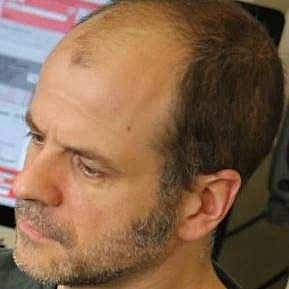
Professor Sam Hayden
Hayden is Professor of Composition at Trinity Laban.
Sam Hayden studied composition with Martin Butler, Michael Finnissy and Jonathan Harvey (University of Sussex), Louis Andriessen (Royal Conservatory, The Hague) and Brian Ferneyhough (Stanford University). He has been the recipient of many awards including first prize in the 1995 Benjamin Britten International Competition and the 2003 Christoph Delz Foundation Competition for Composers. He has undertaken residencies at the Civitella Ranieri Center (Umbria) and the Akademie Schloss Solitude (Stuttgart) and computer music collaborations with NOTAM (Oslo) and the Centre Henri Pousseur (Liège). His work utilises computer-assisted compositional techniques combining spectralist and stochastic approaches.
Research interests and areas of supervision:
- Composition (acoustic and digital)
- Interactive computer music
- Computer-assisted composition
- Contemporary music notation (included digitally-mediated)
- Approaches to improvisation
- Interdisciplinary collaboration
Biography
Commissions include works for Duo Antongirolami-Selva, BBC Symphony Orchestra, Séverine Ballon, Christopher Redgate and Cikada Ensemble, ELISION Ensemble, Duo Galeano-Javaid, Mieko Kanno, London Sinfonietta, Ensemble Musikfabrik, Ensemble Mosaik, Duo Öhman-Kordzaia, Frode Haltli and Oslo Sinfonietta, Quatuor Diotima, RepertorioZero, Mats Scheidegger and Steamboat Switzerland, performed at festivals including Ars Musica (Brussels), BBC Proms (London), Música Contemporánea Fundación BBVA (Bilbao), Bludenzer Tage zeitgemäßer Musik, Gaudeamus Muziekweek (Utrecht), Huddersfield Contemporary Music Festival, Festival Images Sonores (Liège), London Ear Festival, MaerzMusik (Berlin), Musik im 21. Jahrhundert (Saarbrücken), Spitalfields Winter Festival, Tage für Neue Musik (Zürich), Ultima Festival (Oslo) and Warsaw Autumn.

Professor Dominic Murcott
Head of Composition
Learn about Professor Dominic Murcott
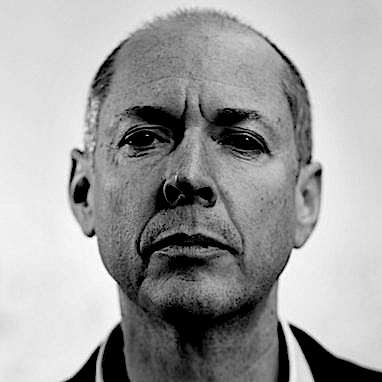
Professor Dominic Murcott
Dominic Murcott is a composer, curator and educator whose work encompasses a wide range of activities. His compositions often combine acoustic instruments with digital media or theatrical ideas and is as enthusiastic about working with amateur musicians as professionals. Two recent projects are released on nonclassical, including the award-winning percussion duo The Harmonic Canon.
Research interests and areas of supervision:
- The interface between classical and popular music, 1960 to present
- The music of Conlon Nancarrow
- The music of Frank Zappa
- The relationship between computer technologies and performance
- Composition education practice
Biography
A specialist in the US-Mexican composer Conlon Nancarrow, he has spent 10 years, researching, curating, arranging and presenting his works around the world.
Starting as a self-taught musician, he has gradually made a transition from playing drums and percussion as a member of The High Llamas as well as recordings with Pavement, Stereolab and many others, to classically-based composition and education. Since 2003 he has been Head of Composition at Trinity Laban Conservatoire of Music and Dance, forming a department that has become well-known for its innovative methods and student-centred approaches.
He has taught at every educational level and is currently in demand as a supervisor and examiner for practice-based PhDs.

Dr Naomi Lefebvre Sell
Associate Director (Dance), Reader of Choreographic Practice and Programme Leader for the MA/MFA Creative Practice
Learn about Dr Naomi Lefebvre Sell
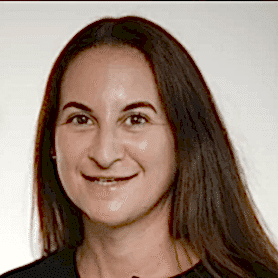
Dr Naomi Lefebvre Sell
Dr Naomi Lefebvre Sell is our Associate Director of Dance, a Reader of Choreographic Practice and Programme Leader for the MA/MFA Creative Practice. Naomi lectures across the BA and MA/MFA programmes within the fields of choreography, performance and research methods as well as supervises Practice as Research PhDs. Originally from Canada, Naomi’s background as a professional dancer includes work with both Butoh and Cunningham-influenced companies. Naomi holds a BFA in Dance from Simon Fraser University and a MA Choreography and PhD in Creative Practice (Dance) from Trinity Laban. She is also a Higher Education Academy Fellow.
Research interests and areas of supervision:
- Creative practice
- Dance making
- Choreographic process
- Scoring, choreographic methodologies and documentation
- Mindful moving and attendance to presence
Biography
Naomi’s professional choreographic work has been commissioned and presented across Canada and Europe (since 1998) within festivals such as TanzArt (Germany), Brighton Fringe (UK), Dancing of the Edge (Canada) and Chutzpah! (Canada). Naomi’s practice-led research is published in academic journals and book chapters (Intellect, Frontiers and Routledge), she presents regularly at national and international conferences and is a reviewer for the Frontiers in Psychology Journal. Naomi’s artistic work and teaching is informed by her doctoral research which examined the effect of mindfulness meditation on a creative process of dance making. Naomi’s current research is funded by Arts Council England.
Qualifications / Educational Background
Graduate Studies & Professional Qualifications
- Reader of Choreographic Practice – July 2021
- Senior Fellow Higher Education Academy – May 2019
- PhD Creative Practice (Dance) – July 2013, Trinity Laban Conservatoire of Music and Dance – London, UK
- Fellow Higher Education Academy – September 2007
- MA Choreography – October 2004 Trinity Laban Conservatoire of Music and Dance – London, UK
Undergraduate Studies
- Bachelor of Fine Arts – Major in Dance – April 1998, Simon Fraser University – Burnaby, British Columbia, Canada
- Professional Dance Diploma – April 1996, Grant MacEwan Community College – Edmonton, Alberta, Canada
Creative Outputs
- Book chapter entitled ‘Moving as a thought process: the practice of choreography through stillness’ for the Routledge Dance Companion Series, edited by Professor Helen Thomas & Stacey Prickett – 2019
- International Association of Dance Medicine and Science, Montreal, practitioner wisdom presentation, October 2019
- 5th International Dance & Somatic Practices Conference – Coventry University – invited presenter – July 2019
- Perf/Forming Future: Artistic Doctorates in Europe, Middlesex University – invited presenter – April 2019
- Frontiers of Psychology, Expertise in evaluating choreographic creativity: An online adaption of the Consensual Assessment Technique, co-authored with Lucie Clements, Emma Redding & Jon May, 9:1448. doi: 10.3389/fpsyg.2018.01448, August 2018
- Presented in Parallax Trinity Laban Research series ‘Moving as a thought process: studio development and creative encounters’ + documentary film by Jason Brooks – October 2018
- Arts Council England, Grant for the Arts funding award – for Part 2 Research and Development – dance-making and mindfulness with Lucille Teppa and Tara Silverthorn – February 2016 – November 2018
- Journal of Performance and Mindfulness, ‘Moving as a thought process: An insight into mindfulness through dance and choreography’, co-authored with Tara Silverthorn & Lucille Teppa, article published Autumn 2018
- XVII International Conservatory Week Festival, St Petersburg, Russia – invited presenter – October 2017
- AHRC Leverhulme Imagery project team for In the dancer’s mind: creativity, novelty, imagination, Trinity Laban Conservatoire of Music and Dance, September 2014 – December 2017.
- 4th International Dance & Somatic Practices Conference – Coventry University – invited presenter – July 2017
- Girls’ Day School Trust, The Cultivation of Mindfulness in Schools conference – invited presenter June 2017
- Presented at Labanarium, Mental imagery and creativity – University of Surrey – January 2017
- International Association of Dance Medicine and Science, Hong Kong, practitioner wisdom presentation entitled: ‘Mindful Moving: An insight into mindfulness through dance-making and choreography’, October 201
- Presented in Parallax Trinity Laban Research series ‘Moving as a thought process: An insight into mindfulness through dance and choreography’ + documentary film by Jason Brooks – October 2016
- Performance and Mindfulness International Symposium, Huddersfield University, paper presentation – June 2016
- Journal Article, ‘Sharing Practitioner wisdom: Collaborative approaches to learning and teaching for contemporary dancers in conservatoire training’, Journal of Dance & Somatic Practices, co-authored with Dr Emma Redding & Alison Curtis-Jones – April 2016, Vol 8, No 2.
- Foundations for Excellence Conference – Meeting the challenges of excellence in Music and Dance – invited presenter – November 2015
- Arts Council England, Grant for the Arts funding award – for Part 1 Research and Development – dharmakaya with Lucille Teppa and Tara Silverthorn – August 2015 – October 2016
- Co-authored book chapter, ‘Dancing and flourishing: mindful meditation in dance making and performing’ with Professor Sarah Whatley in Dance, Somatics and Spiritualties: Contemporary sacred narratives, leading voices in the field, edited by Sarah Whatley, Glenna Batson, Amanda Williamson, Intellect November 2014
- International Association of Dance Medicine and Science, Basel, Switzerland, practitioner wisdom presentation entitled ‘Interdisciplinary approaches to learning and teaching for contemporary dancers in conservatoire training’, October 2014
- World Dance Alliance Global Summit, Angers, France, panel presentation entitled ‘Interdisciplinary approaches to learning and teaching for contemporary dancers in conservatoire training’, July 2014
- PhD Creative Practice (Dance) thesis entitled dharmakaya: An investigation into the impact of mindful meditation on dancers’ creative processes in a choreographic environment, June 2013
- Research in Dance Education Volume 11 Issue 3, 251, book review of Charm and speed: virtuosity in the performing arts, V. A. Howard , June 2010
- Authored chapter in The artists’ stories: Featuring 30 Canadian Artists, published by Canadian Arts Alliance, June 2006
- International Association of Dance Medicine and Science, Stockholm, Sweden, ‘The development of a longitudinal inter-disciplinary screening program for full time dance students’. Paper presentation, Emma Redding, MSc, Rogerio Correa, Peter Curtis, Sarah Irvine, MSc, Naomi Lefebvre Sell, MA, November 2005
Link to PhD thesis:https://openaccess.city.ac.uk/2634/
Awards:
- External Examiner, Bath Spa University, BA Dance, 2021-2024
- Professional Development Course for External Examiners, Advance HE, 2018
- External Examiner, University of Sunderland, BA Professional Dance, MA Advanced Dance Practice, MA Advanced Professional Practice (Dance), 2018-2022
- External Examiner, University of Salford, BA (Hons) Dance 2019-2023
- Validation panel member, University of Sunderland, BA Professional Dance, MA Advanced Dance Practice, MA Advanced Professional Practice (Dance) 2018
- Reviewer for Arts, open access journal
- Reviewer for Frontiers in Psychology – an open access online journal

Dr Aleks Szram
Artistic Director
Learn about Dr Aleks Szram
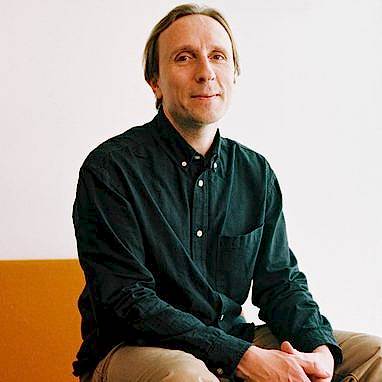
Dr Aleks Szram
Dr Aleks Szram joined Trinity Laban’s teaching staff 15 years ago and was appointed Artistic Director in September 2024. Aleks is additionally a Reader in Performance Studies and a Senior Teaching Fellow, where he supervises creative practice PhDs. Previously, Aleks was programme leader of the BMus and Foundation programmes.
Research interests and areas of supervision:
- Piano performance
- 20th and 21st century performance practice
- Indeterminacy, aleatoric music and graph scores
- Chamber music
- Critical pedagogy
- Online and blended learning environments
Biography
As a council member of MusicHE, Aleks has been involved in recent cross-institutional campaigns to safeguard the future of music at UK conservatoires and universities. He is a QAA performing arts subject specialist assessor. He has written several articles and a book chapter on blended learning and critical pedagogy and is an external specialist at BIMM.
As a performer, Aleks specialises in performing music of the 20th and 21st Centuries and has released several albums of contemporary repertoire on the Prima Facie record label, including the Piano Concerto by Daryl Runswick, Inner Landscapes (Douglas Finch), A Land so Luminous (Kenneth Hesketh), and the album Aztec Dances with the recorder player Jill Kemp. He has recorded for Nimbus with the flautist Wissam Boustany, and given premieres of works by Frederic Rzewski, Dai Fujikura, Haris Kittos, Edward Gregson, Nicola LeFanu, Sam Hayden and David Bedford, among others.
As pianist in the ensemble Gemini, he has recorded three albums with Métier, including works by Jonathan Harvey, Sadie Harrison, Huw Watkins, Philip Grange, and the first recording of Mandala 3 by David Lumsdaine. As well as Gemini, Aleks works with Lontano, rarescale and the Continuum Ensemble. He has performed in more than forty countries over six continents, on BBC Radio 3, Classic FM, Channel 4, and Colombian and Lebanese television.
All research supervisors
- Dr Lyndsay Barnbrook
Dr Lyndsay Barnbrook
Programme Leader: CertHE Musical Theatre Foundation, MA Musical Theatre
Learn about Dr Lyndsay Barnbrook
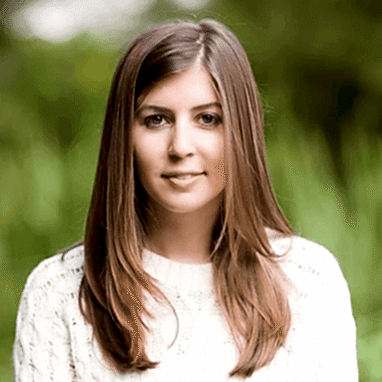
Dr Lyndsay Barnbrook
Lyndsay (BA Hons; MMus; PhD) is a freelance musical director, composer/arranger and lecturer. At University, she studied under David Owen Norris and Matthew Scott (Head of Music, National Theatre). Lyndsay has worked on a wide variety of music theatre projects as Composer/Arranger and Musical Director, and has taught on Foundation, Undergraduate and Postgraduate courses at universities and drama schools/conservatoires including as Course Director for CPA Studios. Lyndsay wrote a number of modules for the Pearson Higher National Diplomas in Performing Arts, acted as consultant for the revised Trinity College London Level 6 Diplomas, and currently holds External Examiner posts for two institutions.
Research interests and areas of supervision:
- Children’s theatre/theatre for young audiences
- Arts education and musical theatre
Biography
Lyndsay’s credits include: Chitty Chitty Bang Bang (Mayflower Theatre); Betwixt! (Trafalgar Studios); Venus and Adonis (Turner Sims Concert Hall); Nicholas Nickleby (Chichester Festival Theatre, Gielgud Theatre); Godspell (Hanger Farm Arts Centre); TheThreepenny Opera (BADA); Alice in Wonderland (Queen’s Theatre); You’re a Good Man, Charlie Brown (Network Theatre); Hello Again (George Cecil Wood Theatre); The Threepenny Opera (Nuffield Theatre); Jesus Christ Superstar (Bournemouth Rep); Liar (Nuffield Youth Theatre), and Much Ado About Nothing (National Theatre).
- Dr Tony Briscoe
Dr Tony Briscoe
Music Production Module Leader
Learn about Dr Tony Briscoe
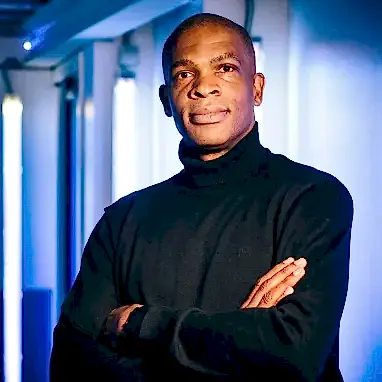
Dr Tony Briscoe
Dr Briscoe works as a professional music producer and composer.
His music industry accomplishments include a range of UK chart successes with artists such as Craig David, Beverley Knight, and the Artful Dodgers. He also composed music for David Attenborough’s wildlife TV series Life in Cold Blood (Under The Skin).
As well as having a Ph.D. in Sound & Vibrations, he has had several years of experience teaching a range of Music and Game technology-related courses around the UK.
Research interests and areas of supervision:
Interactive music technology in performance:
- Development of interactive apps or tools that enhance live musical performances
- Integration of real-time audience interaction through mobile devices during concerts
Game audio techniques in live music:
- Utilising Audiokinetic Wwise in live performances for dynamic soundscapes
- Incorporating adaptive audio systems from video games into stage performances
Innovations in sound design and production:
- Advanced techniques in sound design for popular music and performance art
- Research on new production methodologies that blend traditional and digital processes
Cross-disciplinary collaboration in the arts:
- Projects that bring together music, visual arts, and technology
- Research on collaborative processes between composers, technologists, and performers
Soundscapes and environmental acoustics in performance:
- Incorporation of environmental sounds into live music
- Use of acoustical data from various environments to influence composition
Sensor technology and gesture control in music performance:
- Utilising sensors to control music parameters during performance
- Development of wearable technology for musicians
The Physics of Musical Instruments:
- Structural analysis of instruments to improve design and sound quality
- Exploration of new materials and technologies in instrument making
- Dr Tom Challenger
Dr Tom Challenger
Professorial Staff - Jazz Composition
Learn about Dr Tom Challenger

Dr Tom Challenger
Research interests and areas of supervision:
- Jazz performance
- Composition
- Jazz theory
- Improvisation
- Professor Gabriella Dall'Olio
Professor Gabriella Dall'Olio
Head of Harp Studies and Harp Chamber Music
Learn about Professor Gabriella Dall'Olio

Professor Gabriella Dall'Olio
Born in Bologna, Italy, Gabriella studied in Italy, France and Germany with Pierre Jamet and Fabrice Pierre, Jaqueline Borot, Giselle Herbert and Anna Loro. Now based in London, she continues to follow an international and high profile career performing and teaching the harp.Captivating audiences around the globe her critically acclaimed recordings span solo, chamber and orchestral works on the Claves, Koch, Stradivarius, Dal Segno and Ambitus labels, and she has also made many live recordings for French, German, Italian and Swiss Radio. Her wide and varied repertoire covers most solo, concertos, chamber music repertoire as well as orchestral works (symphonic, operatic and ballet). Internationally active as a soloist and chamber musician, Gabriella has given recitals and concerts throughout Europe, USA, the Far and Middle East. She also freelances with some of the most outstanding UK and European orchestras: the Vienna Philharmonic, Vienna State Opera, Chamber Orchestra of Europe, Bavarian Radio Symphony Orchestra, London Symphony Orchestra, BBC Symphony Orchestra, the Philharmonia, the Royal Philharmonic Orchestra, the English Chamber Orchestra, the Orchestra of the Age of Enlightenment, and the Orchestra of the Royal Opera House, Covent Garden. Conductors she works with include Nikolaus Harnoncourt, Mariss Jansons, Valery Gergiev, Simon Rattle, Lorin Maazel, Sir Colin Davis, Antonio Pappano, Bernard Haitink, Seiji Osawa and Esa-Pekka Salonen amongst countless others.
Research interests and areas of supervision:
- Harp performance
- Musicology
Biography
As well as her work as Head of Harp at Trinity Laban Conservatoire of Music and Dance in London, and her recent appointment at Chethams School of Music in Manchester UK, Gabriella gives masterclasses and harp courses as well as orchestral courses in Italy, Spain, France, Sweden, Singapore, Tasmania and Australia. She has also been a jury member in competitions (BBC Young Musician of the Year [strings final]; F.Godefroid International Harp Competition in Belgium, Arpaplus in Spain and North London Competition, etc).
Furthermore, she is actively involved in community music projects, ranging from babies of a few months old to elderly people, hospitals and special needs schools. Her wide experience of teaching all ages and all backgrounds reflects her commitment to music-making at the highest international level, not only in the solo scene but also chamber music and orchestral, and community work and cross-collaborations. Gabriella and choreographer Susan Sentler work together with dancers and harpists to promote new explorations between movement, sounds and shapes.
Gabriella has earned considerable recognition and has been supported by the Swiss fund ‘Junge Kunstler’. She is also the winner of numerous prizes, awards and scholarships, including the 1989 Victor Salvi Competition, Italy, and the Junge Kunstler prize, Switzerland.
In 2017 she received her Senior Fellowship in Higher Education, and the following year a Professorship.
- Dr Helen Evans
Dr Helen Evans
Acting Lead
Learn about Dr Helen Evans
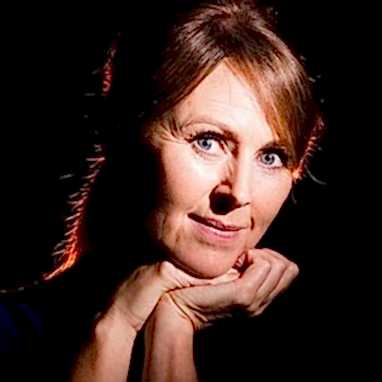
Dr Helen Evans
Helen has been responsible for actor-training for the BA (Hons) Musical Theatre Performance course at Trinity Laban Conservatoire of Music and Dance since 2013.
Helen is a Lecturer, Director, Actor/Performer, Practitioner-Researcher and Visual Artist. As an educator, she has over 25 years’ experience in actor-training, course-development, academic supervision and theatre making in a combination of University and Conservatoire settings.
Biography
Educationally, Helen holds a PhD in Surveillance Performativity/ Immersive Performance from The Royal Central School of Speech and Drama, University of London, where she was a recipient of a Research Bursary under the tutelage of Professor Stephen Farrier. She holds an FHEA through Trinity Laban, an MA Performance Practices and Research, also from RCSSD, and a BA First Class (Hons) Acting from Bretton Hall.
Helen’s directing credits include Amour, The Beggars Opera, Company, Electra, The Dreaming, The Pirates of Penzance, The Caucasian Chalk Circle, Anything Goes, Epsom Downs, Zombie Prom, many industry-showcases and various devised and research-related, personal works. As a guest director for The Dot Collective – a theatre company ‘[…] with access needs at its core, reducing isolation for those with additional needs and dementia’ – Helen has, most recently, collaborated in research and development for Project Portmanteau, in addition to co-directing the 2023 tour of Alice’s Adventures in Aerieland.
Helen has several practice-based research avenues, including, Meisner Technique for Neurodivergent Student-Actors, Immersive Performance, and Surveillance Performativity in Public Space, about which she has presented a number of papers at a variety of academic conferences.
Helen continues to work as an actor. Her theatre acting credits include, classical (mostly Shakespeare) and contemporary non-musical and Musical Theatre (the latter, including Les Misérables, Singin’ in the Rain and the UK premiere of Lippa’s John and Jen). Helen’s experience in television – much to the amusement of her students – includes roles in BBC’s BAFTA winning Trapped and the BBC-British Museums collaboration Relic: Guardians of the Museum (also BAFTA winning).
Research interests:
- Neurodivergence-inclusive Acting and Performance Practices
- Surveillance-Performativity/ Social Performance
- Flâneurie, historically and contemporarily, as surveillant practice
- Politics and Aesthetics of immersive theatre participatory practices
- Douglas Finch
Douglas Finch
Professorial staff - Piano, Chamber Music and Collaborative Piano
Learn about Douglas Finch

Douglas Finch
Douglas Finch was born in Winnipeg and began improvising, composing and performing on the piano from an early age with the help of his mother. He later continued studying with Winnifred Sim, Jean Broadfoot and at the University of Western Ontario with William Aide. After receiving a Masters from Juilliard in New York under Beveridge Webster, Douglas won several awards and was a finalist at the Queen Elisabeth International Piano Competition in Brussels. After moving to London, he co-founded The Continuum Ensemble in 1994 and has collaborated in premiering many new works. He appears regularly with the ensemble at festivals including Spitalfields and at Southbank Centre, featuring composers such as Julian Anderson, Georges Aperghis, Henri Dutilleux, Charles Ives, Claude Vivier, Errollyn Wallen, Iannis Xenakis and many others. He has composed for piano, chamber ensemble, orchestra, theatre and film and his score for the feature film Painted Angels was described in The Independent as “an extraordinary triumph of artistic will”.
Research interests and areas of supervision:
- Transcription and borrowing approaches in musical composition
- Overlapping working methods in improvising and composing
- Contemporary music practice / collaboration / curation
- Composing music for independent art films
- Dr Leo Geyer
Dr Leo Geyer
BMus Module Leader
Learn about Dr Leo Geyer
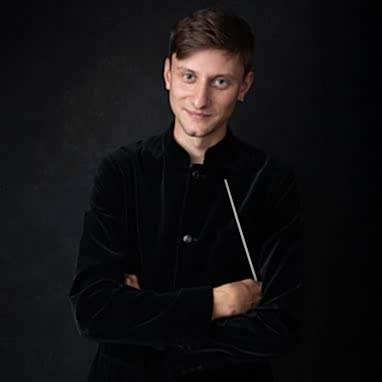
Dr Leo Geyer
Born in London of Anglo-Indian descent, Dr Leo Geyer is a composer, conductor, and presenter. He began his career as a Cover Conductor for the Royal Opera House. Now, he is the founder and Artistic Director of Constella Music – the creative powerhouse that performs, broadcasts and publishes Leo’s work. This includes Constella’s performances of Leo’s restorations of unheard music written in Auschwitz, resulting in worldwide news coverage and the documentary The Lost Music of Auschwitz, hailed by the Financial Times as “profoundly moving”.
Biography
Leo has a doctorate in composition from Oxford University and has received various accolades for his music which includes the Lord Mayor’s Composition Prize. Leo’s music has been described by The Times as “imaginative and beautifully shaped” and has received performances by ensembles including the English Chamber Orchestra, London Sinfonietta, Rambert Dance Company and Opera North.
Described by James Murphy, CEO of the Royal Philharmonic Society as “one of the great young British conductors to watch,” Leo has worked as a guest conductor with the BBC Concert Orchestra, English National Opera, Birmingham Contemporary Music Ensemble, the National Theatre, Luxembourg Kammerata, Ensemble 212 (USA), AUT (Denmark), and other ensembles.
Leo trained as a broadcast presenter on the BBC Open Music Programme with Katie Derham as his mentor. He made his debut at the Royal Albert Hall as part of the BBC Proms, broadcast live on Radio. Since then, Leo has appeared on numerous radio and television programmes on BBC Radio 3 and 4, ITV, and Sky Arts.
Research interests:
- Music and the Holocaust
- Contemporary Opera-ballet
- Choreomusicology and interdisciplinary collaboration
- Creative Interpretation in Music
- Composition Restoration
- Professor Deirdre Gribbin
Professor Deirdre Gribbin
Professorial Staff - Composition
Learn about Professor Deirdre Gribbin

Professor Deirdre Gribbin
Deirdre Gribbin is an Irish composer, whose work has been described as “astonishingly accomplished” and “pure magic” and “so powerfully expressive that it communicates its meaning instantly” by Richard Morrison in The Times, for her Aldeburgh produced opera “Hey Persephone!” which won The Arts Foundation Award for Opera, and Northern Arts Outstanding Artist Award. She was appointed as External Output Assessor for the Research Excellent Framework; REF 2020-22.
Research interests and areas of supervision:
- Composition
- The interface between music and theatre audiences
- Music and interactive healthcare technology in practice and rehabilitation hospitals in Canada
- Music and genetics
- Composition as a developmental tool for young adults with cognitive delay
- The music of Per Norgard
- Orchestration and the capacity of acoustic sound
- The role of women in music
- Music written out of conflict
- Audience participation and inclusive in contemporary music experiences
- Music, new plays and dance
Biography
‘Hearing Your Genes Evolve’ for string quartet featuring in a Filmtank Production, ‘The Dark Gene’ was nominated for a Berlinale Film Festival Documentary Prize. Other awards include the Chester Schirmer Fulbright Fellowship, UNESCO International Rostrum of Composers Award for my orchestral work ‘Empire States’, a Leverhulme Fellowship, a Sir Winston Churchill Fellowship, a Leverhulme Artist-in-Residence at MRC Laboratory of Molecular Biology, Cambridge, a PRS Women Make Music Award for ‘Reflected Glory’, a Major Individual Artist Award from the Arts Council of Northern Ireland and a PRS Composers’ Award in 2020. Her music has been recorded by Crash Ensemble and for a new film about genetics available on ‘constellations.world’
Her orchestral work was recorded for the lyric fm label ‘Irish Composers Series’ and her chamber music CD, ‘Island People’ was recorded for NMC. Richard Whitehouse in Gramophone wrote “the chamber domain seems ideally suited to her often inward and intimate manner of expression…it traverses a wide emotional range …a release that is cordially recommended to Gribbin admirers and newcomers alike.”
- Dr Bruno Heinen
Dr Bruno Heinen
Professorial Staff – Jazz Piano, Jazz Composition
Learn about Dr Bruno Heinen

Dr Bruno Heinen
Described by the Guardian as “eclectic, eccentric, and unobtrusively erudite”, Bruno Heinen is a London-based contemporary improvising pianist, composer and educator.
Research interests and areas of supervision:
- Using twentieth century classical works as a springboard for new improvised jazz composition
- Improvised counterpoint: counterpoint as a route to the surprising
Biography
Bruno is a frequent host of the Ronnie Scott’s Late Late show, and has performed in venues and festivals including Southbank Centre, the Shanghai World Music Festival, the London Jazz Festival, Malta International Arts Festival, the Rest Is Noise Festival, Cadogan Hall, and the Royal Albert Hall. He has had his music played on BBC Radio 3, Jazz LineUp, Late Junction, BBC6 Music, BBC Scotland, in Austria, Canada, and the USA, as well as giving live broadcasts and interviews for the BBC and Rai 3 Italy.
He was taught by the late John Taylor and Pete Saberton, and has just been awarded an AHRC-funded practice-based PhD from the Royal Northern College of Music with the title ‘Counterpoint in jazz piano with specific relation to the solo work of Fred Hersch‘. As part of his research, he received funding to travel to New York City to interview and work with Hersch in 2016.
As a composer, Bruno has written for groups ranging from sextet to two pianos and percussion (for a project with Pete Saberton), and from big band to classical string ensemble (for a commission in 2017 from the Camerata Alma Viva). In 2009, Bruno was nominated for the Paul Hamlyn Composers Award.
He recently held the piano chair for two performances of Bernstein’s Wonderful Town at the Barbican Centre with the London Symphony Orchestra, conducted by Sir Simon Rattle.
Bruno has a longstanding musical partnership with the outstanding Palestinian singer, composer and broadcaster Reem Kelani.
- Dr Hans Koller
Dr Hans Koller
Associate Director (Music), Head of Jazz, Interim Head of Percussion
Learn about Dr Hans Koller
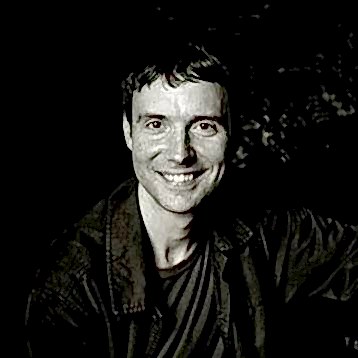
Dr Hans Koller
Hans Koller was born into a musical family, his father was a jazz-loving Lutheran pastor, his mother a music teacher and his four sisters all played instruments.
Koller started playing in bands with saxophonist Stan Sulzmann and trumpeter Chris Batchelor and went on to form his own group, ‘Neverland’, with bass player Dave Whitford, saxophonist Rob Townsend and drummer Stuart Laurence. This group was augmented into a nine-piece outfit for Koller’s début album Magic Mountain (1997), which established him as one of the leading new jazz composers in the UK. Three years later he won the Joey Award for composers organised by Eastern Arts, and subsequently was awarded major commissions by Birmingham Jazz and by the Freden International Music Festival. In 2001 he released Lovers and Strangers, an album featuring his trio alongside the harpist Helen Tunstall, the singer Christine Tobin and the percussionist Corrina Sylvester.
Research interests and areas of supervision:
- Composition and improvisation, specifically 12-tone improvisation and development and transformation of serialism and counterpoint for jazz composition and performance
- George Russell’s Lydian-Chromatic Concept of Tonal Organization
- Thelonious Monk
- Jazz histories and futures
- Jazz pedagogy
- Collaboration with dance
Biography
His next album, New Memories (2002), was hailed as “the most expansive, expressive and exciting new jazz orchestral sound to have emerged in this country since the late-lamented Loose Tubes” by John Fordham in The Guardian.
“An exuberant and remarkable talent, Koller’s music is full of surprises.” – Ian Carr – Rough Guide to Jazz, 3rd edition (2004).
Over the next decade Koller worked on refining his sound, writing for Steve Lacy (London Ear ), working in large group contexts with Evan Parker, and with Kenny Wheeler and Bob Brookmeyer, performing and recording with the NDR Bigband (Scenic Routes ), as well as playing piano in various groups led by Mike Gibbs (including a tour of England in 2007 alongside Steve Swallow, Bill Frisell and Adam Nussbaum).
Subsequently, Koller produced a number of significant outputs of his own music including performances with Phil Woods and the BBC Big Band, a project with Dave Liebman, writing for the WDR Big Band with Gerard Presencer, a project with the HR Big Band, and, in 2009, an album with Bill Frisell and Evan Parker (Cry, Want ). Koller had by then begun to focus on valve trombone, inspired by a 2006 study/stay at Bob Brookmeyer’s house, and started a fruitful small band partnership with drummer Jeff Williams, and bassist/trumpet player Percy Pursglove. He recorded quartet albums for Babel (Chasing the Unicorn), with Paris-based Canadian saxophonist François Théberge, for Evan Parker’s PSI label with the legendary German saxophonist Gerd Dudek (Day and Night), and in 2011 started forming a formidable creative partnership with NYC altoist John O’Gallagher. On their first meeting, Koller and O’Gallagher were memorably described by John Fordham in The Guardian as “two heavyweight theoreticians fizzing with jazz heat”, and the pair went on to work regularly, producing two BBC Radio 3 broadcasts, performances and recordings in both large ensemble and quartet contexts, and collaborating in a 2015 commission from Jazzlines to write for the renowned BCMG (Birmingham Contemporary Music Group).
Koller’s most ambitious work, his 2016 triple vinyl release Retrospection (on Stoney Lane Records), brought together over 30 of the world’s leading jazz musicians, including Steve Swallow, Jakob Bro, and the NDR Bigband.
Growing up in rural Bavaria, Koller first came into contact with jazz musicians in his teens while attending jazz summer schools run by Brian Abraham’s District Six in Ingolstadt. In 1991 he came to England, first to Middlesex University where he majored in composition, then at the School of Oriental and African Studies (SOAS) where he obtained a masters degree in Ethnomusicology.
Creative Practice:
Over the last 20 years Koller has created a substantial body of over 80 original compositions, recorded in fourteen critically acclaimed albums. His works have been performed, interpreted and/or documented in collaboration with many of the leading lights of contemporary jazz such Bill Frisell, and Steve Swallow, with the pioneers of the early Avant-garde such as Steve Lacy, Alexander von Schlippenbach and Evan Parker, and with the genre-defining, ground-breaking composers/improvisers Bob Brookmeyer, and Kenny Wheeler.
Chris Parker described Koller as “simply one of the UK’s most individual voices, both as a composer and pianist”. His début big band album New Memories from 2002 was hailed by John Fordham in the Guardian as “the most expansive, expressive and exciting new jazz orchestral sound to have emerged in this country since the late-lamented Loose Tubes” and his 2011 record with Bill Frisell was named an “instant classic” by John Eyles, giving it five stars. His recent triple vinyl release received five stars in Jazz Journal, as well as from Mike Gates (UK Vibe) who described the recordings as “an incredible achievement [which] have to be rated as one of the most important and musically rewarding releases of 2016.” Matt Miller, writing in New York City Jazz Record, described him as “an artist steeped in tradition but with a distinct voice of his own”, while Dave Gelly, writing in the Observer, went as far as saying that “like his piano playing, Koller’s writing for large ensemble is difficult to describe because it doesn’t sound remotely like anyone else’s.” Michael Tucker noted that his “approach to the interplay of the historical and the contemporary is as open-minded as it is creative”. Ian Carr, in his entry on Koller in the Rough Guide to Jazz (4th edition), remarked: “Koller is an exuberant talent, his music full of surprises”. And John Fordham, who has written on his work regularly since the early 2000s commented in 2016: “Koller solves the perpetual jazz conundrum of making music for the mind and the body […] with an intelligence and vivacity that brings him ever closer to the stature of George Russell, Gil Evans, Mike Gibbs, and that long procession of his famous elders”.
Conceptually, the body of work that Koller has created is important through the way in which it challenges prevailing, orthodox ideas about innovation and tradition in jazz. He has always looked at the history of jazz as a history of continuous renewal and re-invention. His rapport and collaborations with Steve Lacy (saxophonist with Thelonious Monk in 1960), with Dave Liebman (saxophonist with Miles Davis 1970-74), and with Bob Brookmeyer (trombonist with Stan Getz and Gerry Mulligan 1954-1957) has helped positioning his works in the context of jazz history, yet he has always viewed tradition and innovation as two sides of the same coin, in much the same way as he approach composition and improvisation as essentially complementary. The development of jazz language is, in his mind, an on-going process, occurring cumulatively, i.e. innovations build on one another without the need to eschew previously valid ideas. Koller considers jazz as an attitude to music making, rather than a circumscribed style. In addition, intrinsic to jazz language is the idea of cross-genre. From its local beginnings to its global present jazz is essentially a musical fusion. He continues to be inspired from within but at the same time he regards crucial work with musicians from outside jazz, and also to adopt and adapt methodologies, concepts, ideas and traditions from outside jazz – to illuminate the inside…
- Dr Amir Konjani
Dr Amir Konjani
Professorial Staff - Composition
Learn about Dr Amir Konjani

Dr Amir Konjani
Amir Konjani (Ph.D.) is a composer, Situation maker, performance designer, and instrument designer for specific films.
His works have been nominated and won many awards including the Ivors Composer Awards 2020, London Symphony Orchestra selected composer (Jerwood composer +), an Oscar in the 90th Academy Awards 2018 .
Research interests and areas of supervision:
- Composition
- Experience design and situation making: shaping immersive environments that engage performers and audiences through creative narratives and spatial sound
- Living and performing sculpture
- Film scoring: composing evocative scores for cinematic storytelling
- Persian music: exploring the intersection of traditional Persian music with contemporary classical techniques
- Performance design
- The art of delivering – contemporary music notation: crafting visual representations of music that challenge traditional notation and performance
- Interdisciplinary collaboration
Biography
Amir is the Director of MA and composition lecturer, at the University of Sheffield.
He has worked with eminent musicians; such as David Alberman (Principal-London Symphony Orchestra), Grammy-nominated pianist Vicki Ray (LA Phil), Clark Rundell (Royal Liverpool Philharmonic ), Gregory Rose, Peter Manning (Royal Opera House), Christopher Rountree (LA Phil), harpist Sioned Williams (BBC Symphony Orchestra), violinist Darragh Morgan, Erika Duke-Kirkpatrick (CalArts), Anne LeBaron (CalArts), The Finzi Quartet, and the poet Ahmad Shamlou.
The composer of Oscar winner movie “The Silent Child’, was fortunate to be part of this diverse international team who presented and performed the work for the parliament members in 2018. Theresa May congratulated the impact the film has had in Parliament as well as the education minister considering a GCSE in British Sign Language for the first time ever. Not only has the film achieved huge critical acclaim but it has also changed the life of one very special young girl. In recognition of the outstanding artistic contributions of the team, the team had the honour to meet her majesty the Queen. The film has played in over 100 film festivals world wide as well as airing on prime time television on BBC One.
Amir secured commissions from London Symphony Orchestra, the BBC World Service, BBC News, British Museum, Royal Air Force Museum, CalArts, Ether Festival and others; his works have been performed at prestigious venues worldwide such as London’s South Bank, at the Ether Festival, Sound unbound, Ashleywood Festival, Royal Welsh College of Music and Drama, Royal Academy of Music, Royal College of music, California institute of the arts, Royal Northern College of music, and on television broadcasts and commercial CDs.
In 2019 his imaginative work for Soveida Harp, Kraken piano, and Kraken Cello received high critical acclaim along with LSO musicians at LSO St Luke’s hall- London.
He has been awarded a full scholarship and gained his Ph.D. at the Royal Northern College of Music. His research relates to Performance Art, theatre, and Performativity. He was also nominated for two Gold medals in composition and he was a composition lecturer at CalArts (US).
He has designed two new instruments for a British movie “Matriarchy” and an epic series in 2021. His Soveida harp’s sound was first unveiled to the public in 2019, at a concert alongside the capital’s renowned orchestra, to critical acclaim. and he will reveal new pieces with this instrument at the 14th World Harp congress 2022 .
- Dr David Leahy
Dr David Leahy
Lecturer in Dance
Learn about Dr David Leahy

Dr David Leahy
Research interests and areas of supervision:
- Improvisation – European free improvisation (music), Contact improvisation (dance)
- Performance studies – spatialised musicking, interdisciplinary, and improvisational
- Performance / research practice – intersecting with Ecology (deep ecology), cognition (embodied and enactive), society (socially engaged practice)
- Charles Linehan
Charles Linehan
Reader in Choreography
Learn about Charles Linehan

Charles Linehan
Charles Linehan is a Jerwood Award winning independent choreographer and Reader in Choreography at Trinity Laban. He has been Choreographer in Residence at The Place Theatre, London; Joint Adventures, Munich; and an Associate Artist with Dance4, Nottingham
Venues and festivals Charles Linehan Company has performed at include: Danspace Project, New York; Kaai Theatre Brussels, Venice Biennale, Bagnolet, Paris; Muffathalle, Munich; National Arts Centre Ottawa, Harbourfront, Toronto; PACT Zollverein, Essen; Hermitage St. Petersburg, the National Theatres of Thessaloniki and Bucharest, Dublin International Dance Festival, Nottingham Contemporary, Brighton Festival and multiple venues in London
Research interests and areas of supervision:
- Choreography
- Creative practice
- Lighting design: role, environment, interactivity
- Film making, photography
- Screen dance festivals: production, curation
Biography
In the last 25 years Charles Linehan Company has been regularly featured in Dance Umbrella Festival, London
Charles has been commissioned to create work by The British Council, a variety of state theatres throughout mainland Europe and Jin Xing Dance Theatre- China’s largest independent dance company based in Shanghai
He is the Founder and Director of London International Screen Dance Festival, a Panel Member for Screendance International Detroit, and curator for Brighton International Screen Dance Festival
Charles’ recent dance film The Shadow Drone Project has been presented at Festivals around the world including San Francisco International Dance Festival, Dance on the Camera, New York; Mexico City Video Dance Festival and Dance Umbrella Festival, London
He received a Winning Film Award for The Shadow Drone Project from Pool: Internationales TanzFilmFestival in Berlin in 2019.
- Dr Ji Liu
Dr Ji Liu
Head of Keyboard, Professorial staff - Piano
Learn about Dr Ji Liu
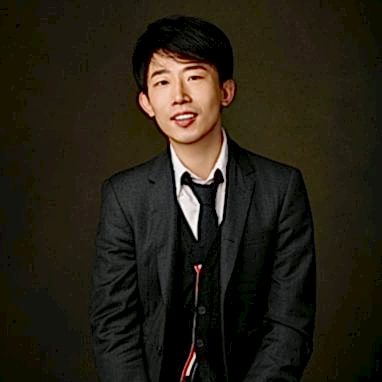
Dr Ji Liu
Ji Liu combines a distinguished and multifaceted career as a pianist, composer, scholar and educator. As an international soloist, he has performed at venues and festivals including Royal Albert Hall, Carnegie Hall, Auditorium du Louvre, Royal Concertgebouw and the National Centre for Performing Arts in Beijing. At Classic FM’s 25th anniversary, Ji Liu performed for His Majesty King Charles III and other distinguished guests at Dumfries House.
Research interests and areas of supervision:
- Programming strategy
- Historically informed and contemporary performance practices
- Participatory performance and audience studies
- Performing (and composing and reworking) unfinished works and works with extended form
- Researching silence
- Schubert studies
- Performance Science
- Applied Technology in Music-Making (machine learning and generative AI)
Biography
Ji Liu has worked with orchestras including the Philharmonia Orchestra, Royal Liverpool Philharmonic Orchestra, Bournemouth Symphony Orchestra, Beijing’s NCPA Orchestra, Xiamen Philharmonic Orchestra, Shanghai Philharmonic Orchestra, etc. He gave the world premieres of Ludovico Einaudi’s Piano Concerto Domino with RLPO and Boris Bergmann’s The Richter Scale and China premieres of Philip Glass’s Complete Piano Etudes and Frederic Rzewski’s People United Will Never Be Defeated! Variations.
As a published composer, Ji Liu has written for orchestras, chamber ensembles and solo instruments. His 18-hour Sonata Fantasy was certified as “The Longest Ever Released Instrumental Work” by the Guinness World Record. His discography encompasses repertoires from the Baroque period to the 21st century.
His research has been presented at institutions such as the University of Oxford, the Sydney Conservatorium of Music, the Orpheus Institute and the University of California.
Ji Liu studied Piano Performance with Professor Christopher Elton and Composition with Professor Ruth Byrchmore at the Royal Academy of Music. He holds a PhD in Music (supervised by Professor Daniel Leech-Wilkinson) from King’s College London and received the Forrest Creative and Performance Leadership Fellowship. Shanghai FM94.7 appointed him the Inaugural Music Ambassador. Since 2018, Ji Liu has served as the Head of Performance at the Kent International Piano Course and is a visiting professor at Shenzhen University.
- Dr Michelle Meinhart
Dr Michelle Meinhart
BMus Programme Tutor, Academic Lecturer, Module Leader, Research Supervisor
Learn about Dr Michelle Meinhart

Dr Michelle Meinhart
BMus Programme Tutor, Academic Lecturer, Module Leader, Research Supervisor
BMus, MMus, PhD
Michelle joined the Faculty of Music at Trinity Laban in 2017 and teaches on a variety of BMus and MMus modules related to music, history and culture and is a PhD and MMus research supervisor. She is also the programme tutor for the BMus programme and is module leader for Music, Culture and Society 4 and 5; the BMus and MMus electives.
Research interests and areas of supervision:
- Trauma studies
- Critical theory
- Medical humanities
- Music and conflict/ war
- Music, memory and narrative
- Music and gender
- Cultural musicology, particularly 19th-, 20th- and 21st-century Britain
Biography
Michelle was formerly a Fulbright Scholar at Durham University and taught previously at the University of Cincinnati College-Conservatory of Music, Xavier University, and University of Tennessee – Southern. Michelle holds a PhD in musicology, with a cognate in British literature and literary theory, from the University of Cincinnati College-Conservatory of Music, and also holds a MMus in music history and a BMus in piano performance. Michelle has also worked as a professional pianist and piano teacher.
Her research uses trauma theory and gender studies within archival and ethnographic approaches to study intersections of music with memory and cultures of care in Britain from the 19th century to today, in order to bring awareness to the significance of music in people’s lives, particularly in relation to mental health and the narrativizing of experience, community, and self. Her publications include the edited volume A Great Divide? Music, Britain and the First World War (Routledge, 2025) and articles in The Journal of Musicological Research, Nineteenth-Century Music Review, Women and Music, and The Journal of the Royal Musical Association, as well as chapters in various edited collections. She co-edited a special issue on music, sound and trauma entitled “Music, War and Trauma in the Long Nineteenth Century” for Nineteenth-Century Music Review (2022) and a special issue on music, sound, and maternity for Women and Music (2022). She is currently co-editing The Oxford Handbook of Music, Sound, and Trauma Studies (2 volumes, 2027). Her research has been funded by the US-UK Fulbright Commission, the National Endowment for the Humanities, the American Association of University Women, and the Music and Letters Trust.
She has been involved in organising several international conferences, including ‘Music, Sound and Trauma: Interdisciplinary Perspectives’ (virtual, Indiana University, 2021); North American British Music Studies Association (Utah State University, 2018); ‘A “Great Divide” or a Longer Nineteenth Century? Music, Britain, and the First World War’ and ‘Conflict, Healing, and the Arts in the Long Nineteenth Century’ (both at Durham University in 2017). She has presented her work at and organised panels for conferences throughout Europe and North America, including annual meetings of the Royal Musical Association and the American Musicological Society.
Michelle is also an editor with the journals Nineteenth Century Studies and the International Journal of Health and Wellbeing. She is on the Council of the Royal Musical Association and serves on Fulbright reading and interview panels. She is a founding member of the Music, Sound, and Trauma Study Group of the American Musicological Society and the Music, Sound, and Maternity Research Network. She holds a Senior Fellowship of the Higher Education Academy.
Publications
Refereed Journal Articles:
“Contractions and Cries during COVID: The Traumatic Soundscapes of Lockdown UK Hospital Maternity Wards.” Women and Music: A Journal of Gender and Culture 26 (2022): 145-166.
“Introduction” to special issue “Music, Sound, and Maternity.” Women and Music: A Journal of Gender and Culture 26 (2022): 68-73.
“Soundscapes of Shell Shock in The Hydra, Journal of the Craiglockhart War Hospital, Edinburgh, 1916-18.” Nineteenth-Century Music Review special issue, “Music and Trauma in the Long Nineteenth Century,” ed. Michelle Meinhart and Jillian Rogers, 2022.
“Introduction: Theorising Music and Trauma in the Long Nineteenth Century”. Nineteenth-Century Music Review special issue, “Music and Trauma in the Long Nineteenth Century,” ed. Michelle Meinhart and Jillian Rogers, 2022.
“Memory, Music, and Private Mourning in an English Country House during the First World War: Lady Alda Hoare’s Musical Shrine to a Lost Son.” Journal of Musicological Research Vol. 31/ 1-3, “Music and World War I.” (March 2014): 39-95.
Book Chapters:
‘Mediating Trauma: Music Theatricals, Intermediality, and Hospital Gazettes in First World War British Military Hospitals’. In Mediality in Music Theatre, ed. Sarah Fuchs and Ingeborg Zechner. Rombach, 2025.
“Introduction: Negotiating the ‘Great Divide’ of the First World War through Music.” In A Great Divide? Music, Britain and the First World War, ed. Michelle Meinhart, Routledge, 2025.
“Music, Work, and the Wartime ‘Angel in the House.’” In A Great Divide? Music, Britain and the First World War, ed. Michelle Meinhart, Routledge, 2025.
‘Designing Trauma-Informed Assessments in the Decolonized Music Classroom: UK and US Contexts’. In Trauma-Informed Pedagogy and the Post-Secondary Music Class, ed. Kimber Andrews and Angela Kristy Swift. Routledge, 2025.
“Rebirthing Britain: Sounding Middlebrow Trauma in the BBC’s Call the Midwife.” The Palgrave Handbook to Music and Sound in Peak TV, ed. Janet K. Halfyard and Nicholas Reyland. London: Palgrave, 2024.
“A ‘Cosy Corner Chat’ about Opera: Fashioning New Femininities in The Gentlewoman and The Lady Magazines, 1885-1914.” In Opera and Print Culture in Nineteenth-Century Britain, ed. Alison Mero and Christina Fuhrmann. Clemson, SC: Clemson University Press, 2023.
“Tommy Music Critics, an Unlikely Community, and The Longleat Lyre During World War I.” In Over Here, Over There: Transatlantic Conversations on the Music of World War I, ed. Christina Bashford, William Brooks, and Gayle Sherwood Magee. Urbana: University of Illinois Press, 2019.
“Variations on the Grand Tour: Musical Seduction and Catholic Communion in the Mid-Nineteenth-Century Italian Travel Diaries of Lady Anne Noel Blunt.” In Perplext in Faith: Essays on Victorian Beliefs and Doubts, ed. Alisa Clapp-Itnyre and Julie Melnyk, 168-207. Newcastle: Cambridge Scholars, 2015.
Edited Journal Issues:
Women and Music: A Journal of Gender and Culture, special issue, ‘Soundscapes of Maternity’, ed. edited with Erin Johnson-Williams and Michelle Meinhart, vol. 26 (2022).
Nineteenth-Century Music Review special issue, “Music and Trauma in the Long Nineteenth Century,” ed. Michelle Meinhart and Jillian Rogers, 2022.
Edited Collections:
A Great Divide or a Long Nineteenth Century: Music, Britain and the First World War, Routledge, 2025.
Review Articles:
“Oh, What a Musical War! A Retrospective after the First World War Centenary.” Journal of the Royal Musical Association, 146/1 (Spring 2021): 1-17.
- Professor Stephen Montague
Professor Stephen Montague
Professorial Staff - Composition
Learn about Professor Stephen Montague

Professor Stephen Montague
Stephen is a composer, pianist and conductor born and educated in the USA but living in Europe since 1972 first as a Fulbright Scholar (Warsaw, Poland, 1972-74) then as a freelance musician based in London but touring worldwide. His music has been performed on major festivals here and abroad including the BBC Proms (Royal Albert Hall), Warsaw Autumn Festival, Paris Festival d’Automne, Venice Biennale, Bang on a Can (New York), and the Singapore and Hong Kong Festivals. His compositional interests cover a wide range and variety of genres from symphonic works, to music theatre and cutting edge experimental. He has worked with many of the world’s leading composers such as John Cage, Mauricio Kagel, Steve Reich, Conlon Nancarrow and Astor Piazzolla.
* Conferred with the title of Professor in January 2017.
Research interests and areas of supervision:
- Composition
Biography
Qualifications/ Educational Background
- Doctor of Music (Composition) Ohio State University 1972
- MMus (Music Theory & Harmony) Florida State University, 1967
- BM (piano) Florida State University, with Honors, 1965
Post-graduate work:
- Stanford University, California 1983
- Computer Music, IRCAM, Paris 1981
- Fulbright Fellowship to work at the Experimental Music Studio, Polish Radio 1972-1974
- Electronic Music, Dartmouth College (USA), 1972
- Certificate in Conducting, Mozarteum, Austria, 1966
Teaching Experience
- Instructor – Butler University, Indianapolis, 1967-69
- Teaching Assistant – Ohio State University 1969-71
- Guest Professor, Royal College of Music, 1988 – 89
- Guest Professor, University of Texas-Austin, 1992, 1995, 2000
- Guest Professor, University of New Zealand, 1997
- Composer in Residence at Trinity College of Music in 2003 -04
- Joined the Trinity composition staff in the autumn of 2004
- Professor, Royal Academy of Music, 2007-09
- Numerous workshops, seminars, new music projects, residencies world wide since 1974.
Creative Outputs
Important commissions have included the London Symphony Orchestra, Royal Festival Hall, International Computer Association, National Portrait Gallery, The Royal Ballet, BBC Proms (Royal Albert Hall), TransAtlantic Arts Consortium, The Bath Festival, ISCM Festival, Cheltenham Festival, Belgian Radio, Warsaw Autumn and Stavanger Speculum Festival (Norway).
CDs of Montague’s works are available on NMC (UK), ASV, Continuum, Op 111, Signum and numerous other labels.
He has published over 50 articles in magazines and journal, and contributed 18 articles to The New Groves Dictionaries of Music.
His music is published by United Music Publishers, UK.
External Appointments
New Music Associate- Kettle’s Yard Art Gallery and Museum, University of Cambridge, 2010-2012 where he runs a monthly concert series.
Awards
International Piano Magazine Award: “Best New Music Piano Recording” (2006) for his CD Southern Lament (NMC)
British Composer Award Finalist, 2004
Fellowship of Leeds College of Music (FLeedsCM), 2004
Honorary Fellow- Trinity College of Music (Hon FTCL), 2001
Year of the Artist Award, 2000, UK
Distinguished Alumnus Award Ohio State University, 2000
Distinction in Computer Music, 1996 Ars ElectronicaPrix, Linz, Austria
Ernst von Dohnanyi Award for Musical Excellence, 1995
First Prize, 1994 Bourges International Competition for Electroacoustic Music, France
Winner, The London Dance and Performance Award for Outstanding Creative Achievement in Music, 1988
Fulbright Fellow, Warsaw, 1972-1974
- Dr Uchenna Ngwe
Dr Uchenna Ngwe
Lecturer in Music
Learn about Dr Uchenna Ngwe
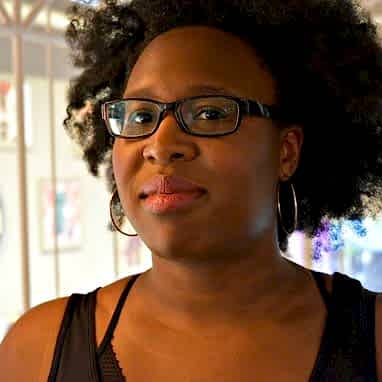
Dr Uchenna Ngwe
Uchenna Ngwe is an oboist, curator, educator, and researcher. Born in North London, she studied oboe and cor anglais at Trinity College of Music from the Junior Department, through undergraduate and postgraduate studies. Alongside a busy freelance career, her interest in research led to a return to study at Trinity Laban and a PhD titled Re-sounding the African Diaspora: Uncovering Afro-British histories in British classical music through curatorial-activism. Since then, her continued exploration into expanding repertoire through creative practice investigates and highlights the lives and work of historical Black classical musicians in Britain from the perspective of a performer-curator-activist.
Biography
The main areas of research that Uchenna is involved in focus on marginalised identities in Western classical music and digital pedagogy. Drawing on years of experience in digital learning, she founded plainsightSOUND – an online research project highlighting the under-recognised work of historical Black African diasporic classical musicians in Britain.
Uchenna is also founder and artistic director of Decus Ensemble – a chamber group specialising in under-performed music composed for wind and strings. Much of their repertoire emerges from her research into Black classical music and repertoire and is regularly presented through concerts and workshops. Uchenna has appeared as a presenter and guest contributor for several BBC Radio programmes, including Sounds Connected and Inside Music. She also presented the BBC Radio 3 Sunday Feature documentary ‘Frank Johnson, Queen Victoria and the Black Brass Band’, which followed her research into the life of the innovative 19th-century African American performer and composer.
Her research interests include:
- Practice-as-Research
- Chamber music
- Black British and European histories
- Classical music curatorial practices
- Decolonial pedagogies
- Digital music scholarship
- Digital learning pedagogies
- Interdisciplinary studies
- Dr Lucía Piquero Álvarez
Dr Lucía Piquero Álvarez
Lecturer in Performance Psychology
Learn about Dr Lucía Piquero Álvarez
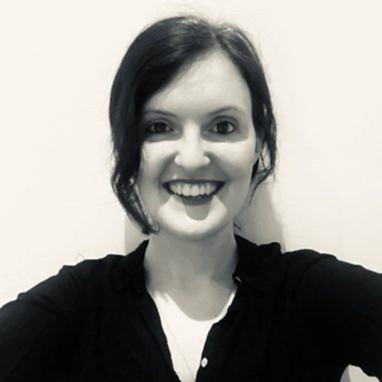
Dr Lucía Piquero Álvarez
Research interests and areas of supervision:
- Choreographic processes
- Spectatorship
- Dance analysis
- Emotion and dance, expression, embodied emotion
- Embodied cognition
- Dr Rebecca Stancliffe
Dr Rebecca Stancliffe
Research Fellow and Lecturer
Learn about Dr Rebecca Stancliffe

Dr Rebecca Stancliffe
BA (Hons) Contemporary Dance, BSc Dance Science, MA/MFA Dance Performance, MA/MFA Dance Leadership and Community Practice, MA/MFA Creative Practice, MSc/MFA Dance Science
Dr Rebecca Stancliffe is a Research Fellow at Trinity working in arts and health, co-production, and digital media. She is also a Lecturer, teaching across undergraduate and postgraduate programmes in dance and dance science in the areas of dance technique, contextual studies, and research methods.
Research areas and areas of supervision
- Creative health
- Co-produced research
- Participatory and community practice
- Philosophy of technology and digital methods
- Online and blended environments for learning and creative practice
- Notation, scoring, documentation
- Dance history
Biography
Rebecca has a BA (Hons) in Dance Theatre with First Class Honours from Laban (2008) and an MA in Dance with Distinction from London Contemporary Dance School (2010). She completed her PhD at the Centre of Dance Research in 2019.
Rebecca’s research and evaluation activity focuses on arts and health, participatory arts practices, and digital media and methods. She is the Principal Investigator for ‘The Language of Pain’ (2023-present), a co-produced research project exploring the expression of pain narratives through arts-based methods. Interested in the postphenomenological experience of our encounters with digital media, Rebecca also explores online and blended environments for community arts practice and what best practice looks like.
Rebecca is author of the forthcoming monograph Video Annotation in Dance and Performance (Palgrave Macmillan) and has co-edited special issues of Theatre, Dance and Performance Training (Training for Movement, Physical Activity and Health, 2025) and International Journal of Performance Arts and Digital Media (Digital Annotation and the Understanding of Bodily Practices, 2021). Her works has been published in International Journal of Performance Arts and Digital Media, Theatre, Dance and Performance Training, [insert name of journal for dance and wellbeing research].
Rebecca’s forthcoming monograph Video Annotation in Dance and Performance (2025, Palgrave Macmillan) explores how we can work with time-based media to develop the analytic capacity and deep attention of human (rather than computational) subjects. She has co-edited special issues of Theatre, Dance and Performance Training (Training for Movement, Physical Activity and Health, 2025) and International Journal of Performance Arts and Digital Media (Digital Annotation and the Understanding of Bodily Practices, 2021). Rebecca’s work has been published in edited books (Intellect, Palgrave Macmillan, Routledge) and journals including International Journal of Performance Arts and Digital Media, International Journal of Qualitative Studies on Health and Well-being, and Theatre, Dance and Performance Training.
She is the Principal Investigator for The Language of Pain (2023-present), a co-produced research project exploring the expression of pain narratives through arts-based methods. Interested in the postphenomenological experience of our encounters with digital media, Rebecca also explores online and blended environments for community arts practice.
Rebecca is an editorial board member for International Journal of Performance Arts and Digital Media. She is a peer reviewer for International Journal of Performance Arts and Digital Media, International Review of Sport and Exercise Psychology, Journal of Dance and Somatic Practices, Journal of Dance Education, and Thinking, Skills and Creativity.
Rebecca has a BA (Hons) in Dance Theatre with First Class Honours from Laban (2008) and an MA in Dance with Distinction from London Contemporary Dance School (2010). She completed her PhD at the Centre of Dance Research in 2019.
Selected publications
Stancliffe, R. (forthcoming, 2025). Video annotation in dance and performance: Attention, thinking and thinking. Palgrave Macmillan.
Stancliffe, R., Wakeling, K., Evans, L. & Howard, S. (2022) ‘Beyond the Walls’: The Artist-Researcher and Performative Dissemination. In R. Prior & T. Fischer (Eds.) Applied Arts and Health, Education and Community: Building Bridges. Intellect.
deLahunta, S., Rittershaus, D., & Stancliffe, R. (2021) Editorial. International Journal of Performance Arts and Digital Media 17(1), 1-6
Stancliffe, R. (2021) Differentiating (an)notation practices: an artist-scholar’s observation. International Journal of Performance Arts and Digital Media 17(1), 69-85
Stancliffe, R. (2021) Moving (together) in a distributed setting: The impact of online music and dance delivery for older adults’ lived experience. In L. Bissell & L. Weir (Eds.) Performance in a Pandemic. Routledge.
Stancliffe, R. (2019) Training the Analytical Dance Eye: Video Annotation for Dance. Theatre, Dance and Performance Training 10(2), 273-288
Stancliffe, R. (2018) Video Annotation for the Articulation and Transmission of Dance. In S. Ellis, H. Blades, & C. Waelde, C. (Eds.) A World of Muscle, Bone and Organs. Coventry University, pp. 358-381.
Stancliffe, R. (2018) Mediating and Visualising Steve Paxton’s Material for the Spine. In S. Whatley, R. K. Cisneros, & A. Sabiescu (Eds.) Digital Echoes: Spaces for Intangible and Performance-based Cultural Heritage. Palgrave MacMillan, pp. 213-230
- Dr Dario van Gammeren
Dr Dario van Gammeren
Digital Learning Manager and Lecturer in Music
Learn about Dr Dario van Gammeren

Dr Dario van Gammeren
Dutch-born classical guitarist Dario van Gammeren has established an international career as a performer, educator and musicologist. He has performed widely as a soloist and chamber musician in the United Kingdom and abroad, and he has worked with numerous composers to broaden the classical guitar’s repertoire. Dario is Programme Leader for the Independent Study Programme (Advanced), the Postgraduate Advanced Diploma, and the Certificate in the Practice of Music Making. In addition, he is Digital Learning Manager, in which capacity he leads on the development and implementation of digital technologies that support a blended approach to curriculum delivery.
Research interests and areas of supervision:
- Guitar performance
- 20th century musicology
Biography
Dario studied classical guitar at the Royal Conservatoire in the Netherlands, where he obtained his Master of Music degree. He then continued his performance studies at the Royal Northern College of Music, where he also conducted MPhil research into composer-performer collaboration. In 2008 he received his doctorate from the University of Manchester, where he researched competing editorial principles, mainly drawing on literary studies, and assessed their applicability to the editing of music for guitar by non-guitarist composers.
Currently, Dario is active in two fields of research. First, he researches music and cultural identity in the Nazi-occupied Netherlands, with a focus on the social impact of Aryanization of the arts. Second, he is engaged in research into the creative use of technology to widen access and participation in Higher Education performing arts programmes. He has published in both fields of research and is a regular speaker at conferences in the United Kingdom and abroad.
In addition to his roles at Trinity Laban Conservatoire of Music and Dance, Dario is a Lecturer in Academic Studies at the Royal Northern College of Music, where he teaches performance studies, practical pedagogy, research electives and artist development, and an Associate Lecturer at the Open University, where he teaches a range of arts and humanities modules. He has held prior teaching posts at the University of Manchester, Department of Music, and the University of Warwick, Centre for Lifelong Learning.
Research Degree Programme students
MPhil and PhD research students

Chelsea Carmichael
PhD Creative Practice: Music
Learn about Chelsea Carmichael
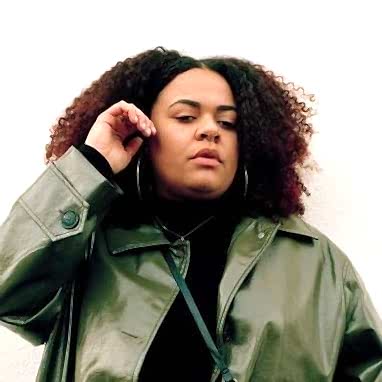
Chelsea Carmichael
Research Supervisors:
Professor Sam Hayden
Dr Tom Challenger
Dr Hans Koller
Research Title:
Jazz as part of the multidisciplinary experience & improvisation across art forms – reimagining how jazz is performed and exploring stimuli for composition.
Research Topic Outline:
This research project explores the use of visual stimuli as the basis for jazz composition; the role of the modern jazz composer/improvising musician in the creation of collaborative work with other art forms; and exploring how one of the pillars of jazz music – our creative practise of communicating and reacting musically on the bandstand – can be a central theme when working with other artistic disciplines. This project will investigate the compositional methods of artists including but not limited to Henry Threadgill, Don Cherry, Jason Moran, The Association for the Advancement of Creative Musicians (The AACM) – who in interviews have often spoken about using other artistic disciplines as stimulus for their music – and vice versa.
Biography
Saxophonist, composer and arranger Chelsea Carmichael is an understated innovator and educator – quietly adding her own contribution to the iteration of jazz that has evolved on these islands. She’s a warm and hypnotic player, who brings powerful and considered improvisation to everything she does. As an educator, she is a small band coach at Trinity Laban; Visiting Lecturer at Goldsmiths putting her research into Black British jazz to good use; and has done some mentoring work for Generations Jazz Festival Band Camp (Switzerland) and the RAUW Academy (Rotterdam); and in 2022 was the Co-Musical Director of the Montreux Jazz Academy (Switzerland) alongside Soweto Kinch.

Ying Chen
PhD Creative Practice: Music
Learn about Ying Chen

Ying Chen
Research Pathway:
PhD Creative Practice: Music
Research Supervisors:
Dr Aleks Szram
Dr Michelle Meinhart
Dr Ji Liu
Research Title:
The interpretative styles implied in Robert Schumann’s piano music, according to his different compositional periods
Research Topic Outline:
In recent years, the art of pianism associated with Robert Schumann’s piano compositions has attracted much attention, with scholarship focusing on Schumann’s piano music in terms of its pianistic textures. This research project aims to trace his ever-changing attitude to his piano compositions by investigating the different editions of Schumann’s piano music, to provide the plurality of interpretative approaches to his piano music, especially for the inner voice, throughout a dynamic process of practice on Schumann’s piano music. Additionally, this project will explore how Schumann’s musical notations trigger the researcher to differentiate their performing decision-making and what is the difference between Schumann’s virtuosity and his contemporaries after solving the difficulties in playing the eccentricities of Schumann’s early version of Kreisleriana, based on the researcher’s artistic experience of playing different editions of this piece.
Biography
Ying’s research interests include musicology, piano practice, performance, genres, 19th-century music and instrumentation, she has a BA in Musicology from Fujian Normal University, and an MPerf in Keyboard (Merit) from the Royal College of Music, London.

Yun Cheng
PhD Creative Practice: Dance
Learn about Yun Cheng
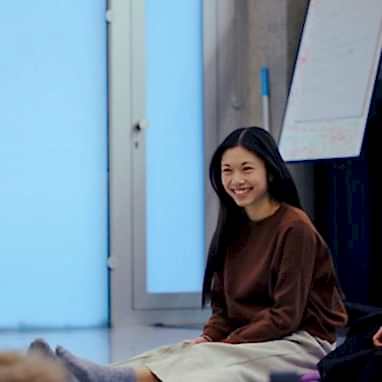
Yun Cheng
Research Pathway:
PhD Creative Practice: Dance
Research Supervisors:
Professor Jonathan Clark
Dr Naomi Lefebvre Sell
Research Title:
Nurturing the Process: A Feldenkrais Method-Informed Choreographic Practice
Research Topic Outline:
Choreographic practices in contemporary dance often highlight individual movement expression and involve collaboration between dancers and choreographers. The choreographic process plays a crucial role in the originality of choreographic work, and its quality can considerably influence the lived experience of those involved. This research examines how to integrate the Feldenkrais Method into choreographic processes and the impacts this approach leads to. Despite the contribution of the limited research on Feldenkrais-informed choreographic practices, our understanding of this interdisciplinary choreographic approach is insufficient. Using a Practice-as-Research (PaR) approach, the choreographer-researcher integrated the Feldenkrais Method into solo and group choreographic processes respectively, resulting in the artistic outcome of three live dance performances. Data was collected through journaling, video recording, and interviews with the dancer-participants. The analysis utilised a mixed approach of phenomenological description and Interpretative Phenomenological Analysis.
Biography
Born and raised in Taipei, Taiwan, Yun Cheng has had a passion for dance since childhood and is now a PhD candidate in Creative Practice: Dance at Trinity Laban. Passionate about the idea ‘serendipity’, Yun explores the connection which one has with themselves and with others. Dance continuously leads her into the unknown field of this theme. Studying and dancing in London as a choreographer and performer, her recent works include:
The Living Body, Laban Theatre, 2024, choreographer-researcher
Attached, The Place Theatre, 2024, Dancer
The Unconditioned, Laban Studio Theatre, 2022, dancer & choreographer
Radio Neighbourhood, Crossrail Roof Garden Canary Wharf, 2022, dancer
0901, The Place London, 2021, dancer
La Obsidiana, Hampstead Heath London, 2020, dancer

Teal Darkenwald
PhD Dance Science
Learn about Teal Darkenwald
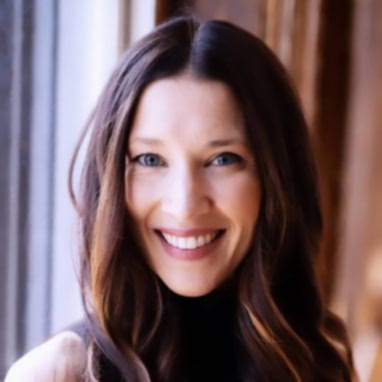
Teal Darkenwald
Research Pathway:
PhD Dance Science
Research Supervisors:
Professor Sam Hayden
Dr James Brouner
Professor Emma Redding (external)
Research Title:
The Body Beyond Instrument: Sensorimotor Transformation Through Whole Body Sonification
Research Topic Outline:
The overall aim of this research is to understand how producing sound generated from 3D joint positional data can be used to elicit a greater sense of embodiment in creative practice and optimize technical performance in training. This investigation explores the artistic and biomechanical possibilities of mapping movement to sound using wearable motion capture suits to produce raw data to be transferred into sound. For creative purposes, the motion capture suit allows for the dancer to become the instrument and create sound in real-time. For biomechanical purposes, the motion capture suit provides auditory biofeedback to elicit a training response, specifically optimizing the tracking of the ankle in the heel rise. In both the creative and biomechanical aspects of this research, identifying whether the sound allows for a more intrinsic motor learning experience for the wearer of the suit is of interest.
Biography
Teal Darkenwald is pursuing a PhD in Dance Science. As the founder of UltraBarre®, she certifies teachers throughout the world in barre-based complementary training and incorporates this work into her teaching at Trinity Laban. Darkenwald is a tenured Associate Professor of dance and biomechanics from East Carolina University where she was the recipient of the Distinguished Professor award for excellence in teaching. In the UK, Darkenwald has served as a performance enhancement tutor and held research, creative and academic roles at Bird College, the University of Essex, Buckinghamshire New University, and Trinity Laban.

Graham Devine
PhD Creative Practice: Music
Learn about Graham Devine
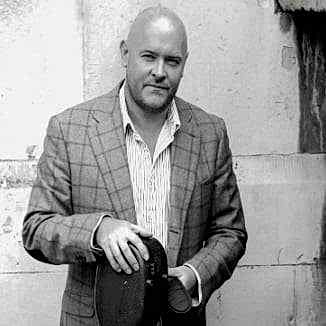
Graham Devine
Research Pathway:
PhD Creative Practice: Music
Research Supervisors:
Dr Aleks Szram
Dr Dario van Gammeren
Dr Ann van Allen Russell (external)
Research Title:
‘How many strings? A methodological approach to the performance of Johann Sebastian Bach’s BWV 995-1006a on the expanded multi-string guitar
Research Topic Outline:
‘How many strings? A methodological approach to the performance of Johann Sebastian Bach’s BWV 995-1006a on the expanded multi-string guitar’ is a creative research project that uses a multi-mode Practise as Research (PaR) methodology to explore Bach’s so-called lute works as transcriptions for the eleven-string guitar through self-reflective practice. The research presents the works in performance score transcriptions for the eleven-string guitar and a performance guide that discusses tunings, ornamentation, interpretation, and an approach to detailed fingering. This is then documented through a studio recording performed by this author on the eleven-string guitar of the complete BWV 995-1006a compositions by Johann Sebastian Bach.
Biography
Graham Anthony Devine was born in England and began his musical studies at Chetham’s School of Music, Manchester studying guitar with Gordon Crosskey. At 19 years old, Graham relocated to Brazil where he lived for almost a decade giving many recitals and masterclasses throughout South America during this period. Widely considered as one of the best guitarists of his generation, Graham is currently in much demand as a recitalist and concerto soloist. He has performed at many of the world’s leading recital venues such as Wigmore Hall (London), Purcell Room (London), Palau de la Musica (Valencia), Hakuju Hall (Tokyo) and Phoenix Hall (Osaka). He has also been invited to give masterclasses at festivals and musical institutes throughout the world. His huge repertoire covers music from the renaissance period to most major twentieth century works written for the guitar, including rarely performed masterpieces such as Maurice Ohana’s compositions for ten-string guitar. Graham plays exclusively on D’Addario strings. Graham is currently Head of Guitar at Trinity Laban. He is also the Artistic Director of the Royal Greenwich Guitar Festival.

Charlotte Eaton
PhD Dance Pedagogy
Learn about Charlotte Eaton
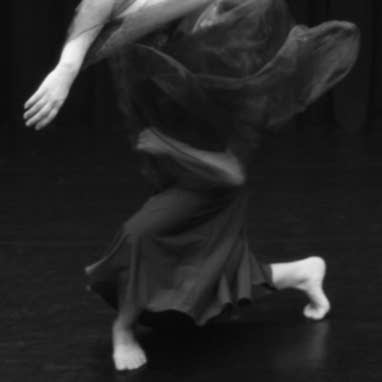
Charlotte Eaton
Research Pathway:
PhD Dance Pedagogy
Research Supervisors:
Professor Jonathan Clark
Dr Naomi Lefebvre Sell
Research Title:
Embodying tactile-kinaesthetic imagery: reimagining bodily/fleshly experience through Somatic Improvisation & expanding its contributions to dance practice, process and product.
Research Topic Outline:
Charlie’s research explores somatic improvisation from the perspectives of practice, process and product. Overarching the project is an open exploration of how somatic improvisation practice utilises tactile-kinaesthetic imagery to inform and reinforce movers’ embodied awareness and understanding of their anatomy and physiology. This practice of Experiential Imaginative Anatomy & Physiology is being disseminated through a handbook to guide practice. An aspect of the research considers the shared aspects of somatic improvisation as a product – or experiential outcome – whilst considering how a training practice becomes both personal and performative when integrated into a choreographic product and witnessed/explored in the public sphere.
A new approach to considering the phenomenological processes underlying somatic improvisation is explored in this research, offering novel terminology to practice: enfleshing and kinaesthetic reimagining. The utility of terms and processes involving philosophical concepts that are embodied everyday when working with tactile-kinaesthetic imagery and the body are packaged in a way that are accessible and meaningful to dancers, with the intention of further guiding movers interested in the sensitive/expressive moving body.
Biography
Charlie is a current RDP student studying for her PhD Creative Practice. She holds a BA (Hons) Contemporary Dance & MSc Dance Science from Trinity Laban and has worked as a performer, educator and choreographer for over 11 years across Devon, Cornwall and London. Her current PhD research explores how the use of tactile-kinaesthetic imagery in somatic improvisation settings can enhance movers’ experience their bodily awareness and somatic understanding through engaging with their anatomy and physiology in new or reimagined ways. During her studies on the RDP, she was diagnosed with endometriosis and has found catharsis in exploring how information arises from and within the body, framing our flesh as an embodied resource for somatically-informed approaches to movement.

David Gardner
PhD Music Science
Learn about David Gardner
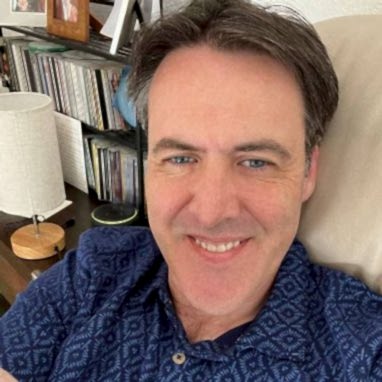
David Gardner
Research Pathway:
PhD Music Science
Research Supervisors:
Professor Emma Redding (External)
Dr Mark Phillips (External)
Research Title:
From Confusion to Clarity: Exploring the Diagnostic and Retraining Challenges for Dystonic Musicians
Research Topic Outline:
The primary aim of this research is to enhance the understanding of musicians’ focal dystonia (MD), a movement disorder that can affect fine motor control. This will be achieved by identifying and analysing the barriers and enablers that musicians face, from the diagnosis phase through to the retraining process. There is a pressing need for improved diagnostic practices, more effective rehabilitation methods, and better support systems, as musicians often find themselves unaware and uninformed about their condition. By assessing current awareness levels among stakeholders and exploring how musicians navigate their retraining journey, we can hope to improve outcomes for those affected by reducing delays and confusion. Additionally, we can draw valuable insights from the experiences of dystonic musicians, enabling healthy musicians to recognise the significance of their neurological playing health and adopt practices that may reduce their risk of developing the disorder.
Biography
David has had a distinguished career as a professional cellist and educator in both the UK and South America. A graduate of TL, he has performed and recorded extensively across Europe and the Americas, both as an orchestral and chamber musician. He is also a founding member of the New World Trio. Following a diagnosis of focal dystonia—a movement disorder that can affect musicians and left him unable to perform—David redirected his efforts towards helping others with the same condition. He now collaborates with fellow music scientists in the search for a cure and methods to prevent its occurrence in others.

Philip Granly
MPhil Creative Practice: Music
Learn about Philip Granly
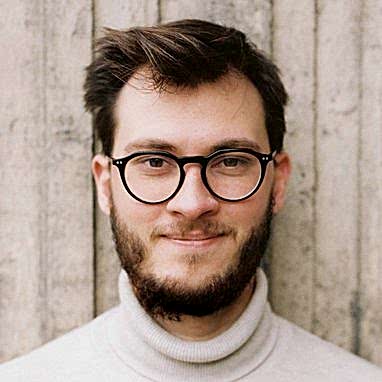
Philip Granly
Research Pathway:
MPhil Creative Practice: Music
Research Supervisors:
Professor Sam Hayden
Dr Bruno Heinen
Dr Hans Koller
Research Title:
Converging Early Music and Jazz
Research Topic Outline:
This MPhil thesis will comprise a creative portfolio of 12 original compositions for solo piano (totaling ≈50 minutes) and a 15,000-word project commentary. The work explores Philip’s role as a composer and performer bridging jazz and classical traditions, with a focus on reimagining improvisational practices from 17th-century music, particularly through the lens of Johann Rosenmüller’s works.
Biography
Philip Edwards Granly was born in Molde in Norway but spent his childhood in Stavanger and Ski. He is a pianist, composer and bandleader currently based in London. At the age of 18 Philip started studying for his bachelor’s degree at the prestigious Jazz Academy at the Norwegian University of Science and Technology in Trondheim, also known as Jazzlinja. Here he explored all the different styles of jazz, from stride to contemporary. Over the years he has especially come to focus on being true to his ideas and developing these further, conveying his personality when both playing and composing. After completing his degree, Philip moved to Oslo where he completed jazz composition at the Norwegian Academy of Music while gaining experience playing in different groups. Now Philip works as a freelance composer and musician, whilst undertaking his MPhil at Trinity Laban.

Johanna Hodson-Prior
PhD Dance Pedagogy
Learn about Johanna Hodson-Prior

Johanna Hodson-Prior
Research Pathway:
PhD Dance Pedagogy
Research Supervisors:
Professor Emma Redding (external)
Dr Liliana Araujo (external)
Research Title:
A Creative Practice Approach to Developing Resilience and Wellbeing Through Dance in Secondary Education
Research Topic Outline:
In a time of decreased mental health and wellbeing of young people, the Arts are an effective way of allowing freedom of expression, creativity and transferrable life skills, all of which play a significant role in the development of positive wellbeing and resilience. The intention of this doctoral study is to contribute to the existing field of resilience and wellbeing research, through a creative dance practice approach in Secondary age students. Using an interpretivist ontology, a group of teachers came together to work collaboratively to develop a Unit of Work to be delivered in schools to Year 7 students (11-12), guided by key aspects identified in the literature surrounding the development of resilience including the development of psychological skills, self-concordance and high-quality dance practice; ownership, creativity, roles, value, process, skills building, goals and the acquisition of strong movement skills. The outcome was ‘The Quest’ a scheme of work which places the student at the centre of their learning, emphasises process over product and promotes learning as non-linear.
Biography
Johanna Hodson-Prior (BA Hons Dance, PGCE Dance, MA Education)
Jo is currently the PGCE Dance Subject Coordinator and Professional Studies Tutor at the University of Chichester and has been working in education for the past 20 years, teaching dance to young people from 11-18 in a Secondary school, as well as teaching contemporary dance vocationally. Jo has continually advocated for the importance of the Arts In schools, with a specific focus on high quality dance and inclusive practice. She is currently completing her PhD at Trinity Laban, focussing on the development of positive mental health and wellbeing in secondary age students, through a creative dance approach.

Jui-Ying Huang
PhD Creative Practice: Music
Learn about Jui-Ying Huang
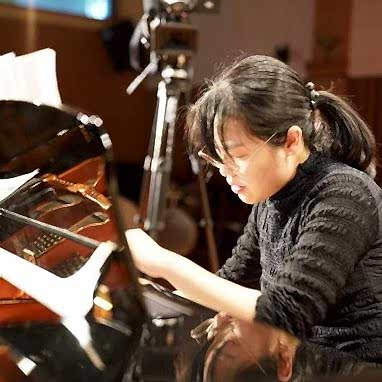
Jui-Ying Huang
Research Pathway:
PhD Creative Practice: Music
Research Supervisors:
Professor Dominic Murcott
Professor Stephen Montague
Research Title:
Next Steps : Innovations Within and Beyond Marching and Minimalism
Research Topic Outline:
While few contemporary composers delve deeply into the subject of marches or martial music, Jui-Ying strives to discover fresh approaches that move beyond their conventional roles — such as facilitating marching progressions or stirring social and ceremonial fervour. Rooted in military traditions, social occasions, and the art of dance throughout human history, marching music is not solely about steady steps or pacing motion. Stripping away its surface reveals an intrinsic connection to physical movement and draws an analogy to the ‘processing’ phenomenon central to minimalism (Reich, 1968). Furthermore, the rigidity, pulsation, and continuum of marching serve to organise soldiers’ steps while spontaneously and simultaneously providing a psychological sense of ‘freedom’ space that propels them toward their destinations. This duality seminary role of percussion in looping, minimalist pop music supports individual expression and synchronising participants within a cohesive musical framework (Stone, 2019). According to these, Jui-Ying has been exploring how their shared elements can shape new marching compositions or inspire other musical forms. By integrating sustained bipedal motion and minimalist analogies, she aims to revolutionise the coexistence and dynamics between liberality and rigour, ultimately achieving a sense of musical ‘flexibility’.
Biography
Jui-Ying Huang (also Ray Huang), comes from Taichung, Taiwan. She is a composer, pianist, and improvisation performer influenced by military, Asian and film music. After graduating from National Sun Yat-sen University (M.F.A) and National Defense University (B.A), she started her PhD programme at Trinity Laban Conservatoire. Her research explores and experiments with repetitive, pulsation and pacing musical movements. She also draws profound inspiration from Taiwanese and aboriginal music. In particular, she is captivated by the Lalingedan (double-pipe nose flute, which means ‘breath of life’), a unique instrument invented by the Paiwan people.

Shiyin Huang
MPhil Dance Science
Learn about Shiyin Huang
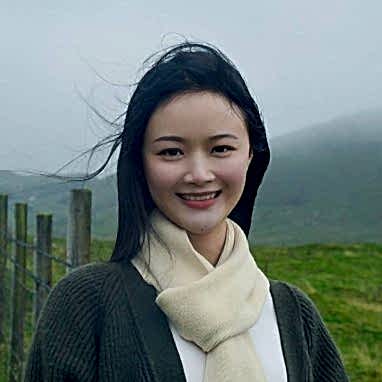
Shiyin Huang
Research Pathway:
MPhil Dance Science
Research Supervisors:
Professor Emma Redding (external)
Dr Liliana Araujo (external)
Research Title:
Musculoskeletal Health in Chinese Classical Dance: From Art to Science to Cross-Cultural Perspectives
Research Topic Outline:
Chinese classical dance originates from traditional artistic aesthetics and includes highly demanding physical requirements which create substantial health challenges for dancers, including the risk of musculoskeletal injuries and chronic pain. Even though numerous scientific studies exist regarding the physical demands in Western dance styles such as ballet, Chinese classical dance lacks sufficient attention from dance science research. This thesis fills the existing knowledge gap by using cultural insights and scientific research to study the physical requirements, injury patterns and health improvement methods in Chinese classical dance. This thesis brings together knowledge of historical dance traditions with modern dance science approaches to expand our understanding of injury prevention and performance enhancement in Chinese classical dance, therefore extending to the scope of dance science research in non-western dance traditions.
Biography
Shiyin began learning Chinese classical and folk dance at eight and trained professionally from seventeen. As a dancer, she performed in the 2018 China Spring Festival Gala. Shiyin pursued her Master’s degree in Dance Science and Education at the University of Edinburgh and is currently conducting research in Dance Science at Trinity Laban. Her work combines dance science and cultural studies to explore musculoskeletal injuries, injury prevention, and performance optimisation in Chinese classical dance. By integrating historical aesthetics with modern scientific approaches, she aims to expand the scope of dance science research in non-Western dance traditions and contribute to a deeper understanding of dancer health and well-being.

Filippo Ieraci
PhD Creative Practice: Music
Learn about Filippo Ieraci
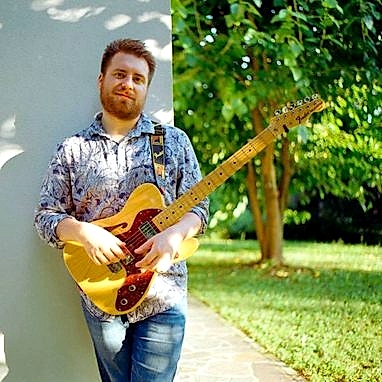
Filippo Ieraci
Research Pathway:
PhD Creative Practice: Music
Research Supervisors:
Professor Sam Hayden
Dr Bruno Heinen
Research Title:
Counterpoint and polyphony in modern guitar. Use and application in improvisation and composition
Research Topic Outline:
This research investigates the application of counterpoint and polyphony in modern guitar, with a focus on composition and improvisation. Despite the abundance of jazz guitar method books, few explore the nuanced interplay of multiple melodic lines. This study aims to bridge this gap by analysing historical and contemporary guitarists, from early classical composers like M. Carulli and M. Carcassi to modern guitarists such as G. Hekselman and L. Lund, who exemplify polyphonic techniques in their playing and compositions. By examining classical and jazz works from diverse historical eras, the research will develop exercises and etudes that incorporate these principles, aiming to integrate them into jazz improvisation and guitar composition. Engaging with leading practitioners and scholarly works, this project seeks to enrich the pedagogical landscape and expand the expressive potential of the guitar. The outcomes will include a series of transcriptions, adaptations, original compositions, and arrangements, culminating in a thesis that offers new insights into polyphonic guitar techniques and their practical applications in modern music.
Biography
As a jazz guitarist and composer, Filippo has performed across Europe and the US, both as a leader and a session guitarist. He holds Bachelor’s and Master’s degrees in Jazz Guitar, graduating with top marks, and has studied with renowned musicians including Glauco Venier and Alfonso Deidda. His publications include the EP Cucumber Green and debut album Trust the Process, which showcases original compositions. He has won awards including “Tomorrow’s Jazz” and has been a finalist in many prestigious international competitions. His work features collaborations with prominent musicians such as John Stowell, and his studies included masterclasses with jazz luminaries including Kurt Rosenwinkel and Gilad Hekselman.

Davood Jafari
PhD Creative Practice: Music
Learn about Davood Jafari
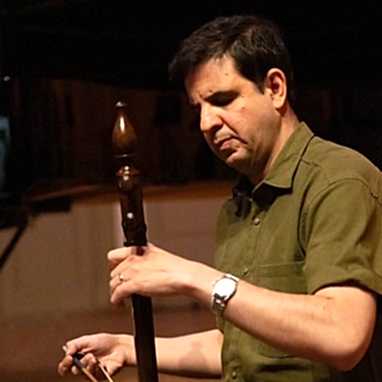
Davood Jafari
Research Pathway:
PhD Creative Practice: Music
Research Supervisors:
Professor Dominic Murcott
Dr Amir Konjani
Research Title:
Polyphonic composition based on Persian music
Research Topic Outline:
Persian music is primarily monophonic, relying on a tuning system with unequal flexible intervals. Its modal system centres around seven Dastgahs and six Avazes, cyclical, multi-modal, and melody-based frameworks within a free metre context called the Radif. Oral tradition and improvisation are key elements of Persian music, while notation is less common. Although accidentals and modulations are limited, Persian melodies are generally characterised by their intricate melismatic patterns.
As a composer and performer with both Western and Persian musical training, Davood has been intrigued by the potential of Persian music as a foundation for polyphonic composition. This PhD, comprising a portfolio of 11 compositions as well as a reflective commentary, explores this potential. Six pieces were composed for Persian ensembles and singers. The first three explore an older Persian tuning system, applying it in both monophonic and polyphonic contexts. The subsequent three compositions look into the modern Persian tuning system and modal framework, displaying dense polyphonic textures through independent melodic lines, the superimposition of Persian Dastgahs, and unprepared modulations. The other five compositions adopt similar approaches to polyphony inspired by Persian music but are written for Western orchestral instruments.
This PhD provides innovative concepts for future polyphonic composition inspired by Persian music addressing the limited documentation and contributions of Persian composers in this area.
Biography
Davood Jafari is a multi-instrumentalist, composer, and performer born in 1982 in Shiraz, Iran. He began playing the piano accordion at age 7, later mastering the violin, kamancheh, (A Persian musical instrument) and piano. He earned a Bachelor’s in piano performance and a Master’s in composition from Tehran Art University. In 2018, he moved to the UK, obtaining another Master’s in composition from Trinity Laban, where he is now pursuing a PhD. His research focuses on polyphonic composition inspired by Persian music, and his work blends Persian musical traditions with Western contemporary art music.

Morad Kashef
PhD Creative Practice: Music
Learn about Morad Kashef
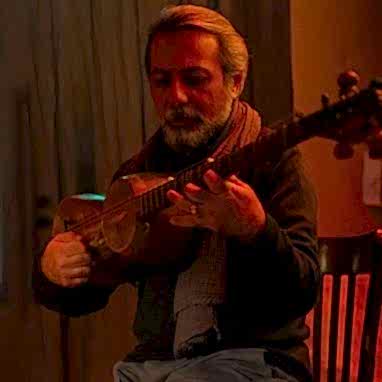
Morad Kashef
Research Pathway:
PhD Creative Practice: Music
Research Supervisors:
Professor Dominic Murcott
Dr Amir Konjani
Research Title:
Azerbaijani Mugham in Contemporary Orchestral and Chamber Music Composition
Research Topic Outline:
This PhD thesis aims to develop and document a novel approach to composition, drawing inspiration from the formal elements and constrained aleatoric systems inherent in the musical traditions of Azerbaijani Mugham. The primary objective is to synthesize aleatoric music and chance factors in Western contemporary compositions, drawing inspiration from Azerbaijani Mugham, thereby expanding the boundaries of musical expression.
By examining the distinctive characteristics of these musical cultures, including modes, intervals, microtones, meters, instruments, and orchestration, as well as cultural differences and similarities, the study aims to identify how these elements can serve as either barriers or advantages in the creation of novel musical structures that bridge Mugham and Contemporary musical styles.
Furthermore, this research intends to contribute original compositions that showcase the integration of Azerbaijani Mugham with Western music, adding various colors to the contemporary musical landscape. Through the exploration of these musical trends and the development of creative projects, the study seeks to demonstrate the potential for cultural dialogue and exchange within the realm of composition.
Biography
Morad Kashef (b. 1970, Tabriz, Iran) is a composer, Azerbaijani tar player, improviser, baritone singer, conductor, and music educator. He began his musical journey at age 15, studying Azerbaijani tar under Master Ali Salimi. After earning a degree in civil engineering, he focused on composition, conducting, and orchestration. In 2002, he pursued formal composition studies with Dr. Mohammad Ansari, later earning a master’s in composition from Tehran University of Art.

Sia Lee
PhD Creative Practice: Music
Learn about Sia Lee
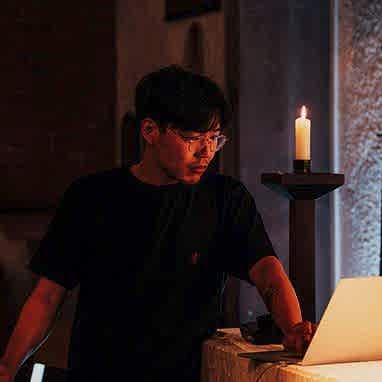
Sia Lee
Research Pathway:
PhD Creative Practice: Music
Research Supervisors:
Dr Guy Harries
Professor Sam Hayden
Research Title:
Expanding Instruments Soundscapes: The Application of Manipulating Acoustic in Live Performances
Research Topic Outline:
This research centres on a real-time live electronic music composition combining jazz, Korean folk music elements, and sound technology, representing the knowledge obtained through education and musical experiences. As a composer, Sia’s objective is to actively employ digital music software and sound equipment, together with both conventional and contemporary music techniques in composition to enhance the diversity and productivity of his work. Contemporary music has made it feasible to experiment with a wide range of new music due to advances in science and technology, recording, and recording equipment, as well as the proliferation of musical expertise among diverse cultures. This includes mixing classical composing approaches with digital techniques, as well as developing a thorough musical composition methodology.
Biography
Sia is a composer and pianist. With a Master’s degree in Composition for Film and TV and a Bachelor’s degree in Music Production, Sia brings a broad range of musical experience and technical knowledge. As a tutor with over nine years’ experience, he taught composition & arrangement, piano, harmony, sight singing & ear training and basic rhythmic analysis. He served in the Korean Navy Band as a pianist for two years as part of his mandatory service. In the Navy, he played in concerts, festivals, banquets and national events and arranged from combo band to big band and wind orchestra. After the service, Sia has worked with a variety of musicians as composer, arranger and pianist, and had many performances in concert halls and jazz clubs. Recently, he worked remotely at an education company in Korea as a composer and audio editor, making AR and MR which included melody and instrumental composition, arrangement, guide vocal recording, basic mixing and mastering.

Xinyu Liu
PhD Creative Practice: Music
Learn about Xinyu Liu
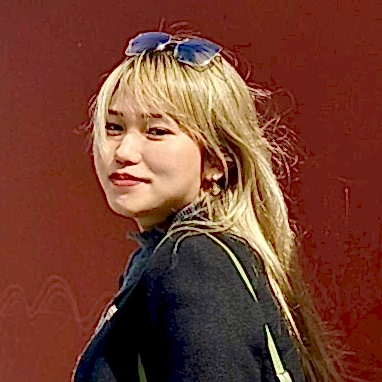
Xinyu Liu
Research Pathway:
PhD Creative Practice: Music
Research Supervisors:
Dr Emilie Capulet
Dr Ji Liu
Dr Guy Harries
Research Title:
Exploring Strategies for Integrating Classical and Contemporary Elements into Participatory Music Performances
Research Topic Outline:
Xinyu’s research investigates the intersection of participatory music performance and the performing arts, focusing on how audience engagement can transform both the spectator and performer experiences. Her work bridges interdisciplinary dialogues around participatory practices, spectatorship, and community dynamics, examining these elements in diverse social and educational contexts in China and the UK. By exploring innovative forms of audience participation, Xinyu seeks to deepen the impact of performances and enhance their creative process. Her research also delves into the integration of visual and light art as tools for fostering participation, thus broadening the ways in which audiences interact with live performances. Through this exploration, she aims to create new modes of interaction that enrich both the audience’s engagement and the overall performing arts experience.
Biography
Xinyu is an experienced pianist and music teacher who studied at Xiamen University and has a Professional Diploma and MMus degree from Trinity Laban. Her research interests include eastern and western music education and participatory performances.

Zining Liu
PhD Creative Practice: Music
Learn about Zining Liu
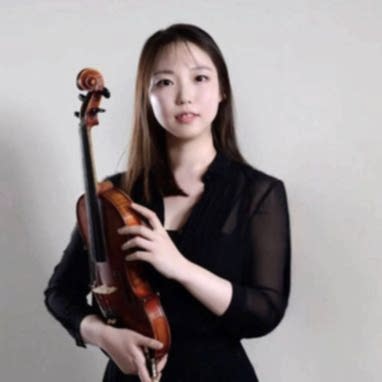
Zining Liu
Research Pathway:
PhD Creative Practice: Music
Research Supervisors:
Dr Emilie Capulet
Dr Michelle Meinhart
Research Title:
Rethinking Bach: Hidden Messages Between the Lines – A Re-Consideration of Interpretative Choices Implicit in the Unaccompanied Solo Violin Music of J.S. Bach
Research Topic Outline:
This is a practice-led research project focusing on the repertoire of J.S. Bach’s Six Solo Violin Sonatas and Partitas, BWV.1001-1006. The focus of the findings is to re-examine the modern approaches and interpretations, based on Bach’s original notations, in performing the Six Solo Violin Sonatas and Partitas. This research does not aim to provide an accurate interpretation of these unaccompanied works, but it attempts to demonstrate how a modern performer exploring the possible ways in examining Bach’s autograph and manuscripts, adapting the relevant knowledge into performances while enhancing the knowledge towards Bach’s performance style.
Biography
Zining is a PhD student in Creative Practice at Trinity Laban, where she is an Ashley Family Foundation Scholar and recipient of the Elisavet Chatzivasileiou Memorial Scholarship. She holds a Bachelor of Music (Honours) from the Royal Northern College of Music, where she was awarded a tuition-fees scholarship. She has furthered her studies in violin performance at both Trinity Laban and Royal Birmingham Conservatoire. Zining has performed widely across prestigious venues such as Wigmore Hall and St. Peter & St. Paul’s Chapel and has contributed to various ensembles and chamber music projects. She has also served as an International Postgraduate Student Mentor and participated in numerous masterclasses with renowned musicians, further shaping her artistic development.

Felice Pomeranz
PhD Creative Practice: Music
Learn about Felice Pomeranz
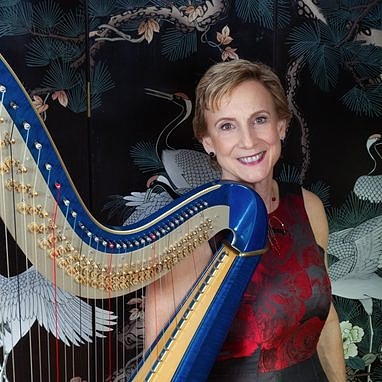
Felice Pomeranz
Research Pathway:
PhD Creative Practice: Music
Research Supervisors:
Professor Sophie Fuller (external)
Dr Hans Koller
Professor Gabriella Dall’Olio (advisor)
Research Title:
The Patriarchy of Jazz: Women, Unusual Instruments, and a New Pedagogy Promoting Inclusion
Research Topic Outline:
The history of Jazz, as an accepted art form, has been studied and documented since early in the twentieth century. Literature about jazz and jazz men is prolific. Books written, for example, by Gunther Schuller, Early Jazz (1968), The Swing Era (1989) or Ken Burns and Geoffrey Ward’s Jazz: A History of America’s Music (2000) cover the progression of the genre through the twentieth century. Many books have been written by the jazz men themselves, such as Miles Davis’ Miles: The Autobiography (1990), or Louis Armstrong, Satchmo: My Life in New Orleans (1986). There are far fewer publications written specifically about women in jazz. Their themes include women’s collective history, struggles, and reluctant acceptance by men into this art form. The concept of the extra burden women jazz artists faced playing unusual instruments, such as the harp, has not yet been extensively discussed.
This work will study women who play instruments not often connected to jazz. The study presented here is an exploration of jazz women playing strings, and especially the harp. The harp has been Felice’s particular instrument of choice for over fifty years. With its ungainly size, weight, and diatonic nature, women harpists have endured special hurdles playing jazz. The core of a jazz group is usually piano, some kind of horn, acoustic bass, and drums. There are many women who play all of these instruments, and they have had their own challenges establishing themselves in an art form mostly led by men. There is an interesting correlation between the advances of women’s rights and freedom with the advancement of women playing jazz, which will be examined in detail. Included in the investigation will be the evolution of jazz and popular music played on the harp, and those who play this music.
The study of women playing unusual instruments would not be complete if it did not include the notion of patriarchy in jazz. This research will address this particular idea with an observation of the past, the present, and looking toward the future of the next generation of jazz artists. How may a new concept of pedagogy create more acceptance of women, queer, and non-binary people joining to make the music? Will tolerance of unacceptable behavior towards women finally become a thing of the past? These are just a few of the questions this work plans to address.
Gaining an understanding of the evolution of jazz and how it relates to women and society as a whole is key to learning how to change the narrative of patriarchy in jazz. Through forums, interviews, surveys, and lived experience, this research intends to discuss the lessons derived from the past. The discussion will include how education, representation, role-modeling, inclusion, welcoming diversity, embracing feminine qualities, and making jazz accessible to new, unusual instruments can elevate the music made in this unique art form.
Biography
Ms. Pomeranz is Professor of Harp at Berklee College of Music in Boston, Massachusetts. She began the Harp Program in the String Department at Berklee College in 2002. Ms. Pomeranz has been a clinician and performer at festivals throughout the United States, Canada, Brazil, Europe, Australia, New Zealand, Asia, and the Caribbean. Her classical and popular arrangements for harp are available at many harp outlets, as are her teaching DVD, Jazzy Beginnings and CD/workbook, Harp in the Band, Vol 1. Her first book, Berklee Harp, serves as an etude and exercise book for harpists hoping to improve their pedaling, chord symbol reading, and improvisation skills. Her most recent Berklee Press book, Contemporary Etudes for Lever and Pedal harps was recently published. Ms. Pomeranz directs the popular harp referral network, The Gilded Harps, organizing events throughout New England and beyond. She is very active in the American Harp Society. Her AHS Foundation Award, Kids for Camp, serves to provide a summer camp experience for needy and underprivileged youth.

Maya-Leigh Rosenwasser
PhD Creative Practice: Music
Learn about Maya-Leigh Rosenwasser
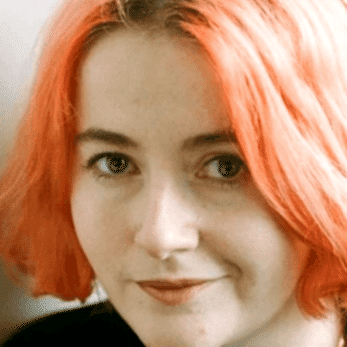
Maya-Leigh Rosenwasser
Research Pathway:
PhD Creative Practice: Music
Research Supervisors:
Professor Sophie Fuller (external)
Dr Guy Harries
Research Title:
Queer Sound: An exploration of LGBTQIA+ community through electroacoustic music practice
Research Topic Outline:
In this practice-based study, Maya-Leigh aims to explore ways in which electroacoustic music practices can be used to create electroacoustic music that is inspired by London’s diverse Queer community. By collaborating with other Queer artists, performing and curating performances in Queer environments and reflecting on their own practice as a London based Queer practitioner, they will examine concepts such as collective Queer expressions of identity, inclusivity and diversity. This study will result in a series of collaborative electroacoustic performances and recordings as well as a portfolio of electroacoustic compositions, composed and performed by the researcher.
Biography
Maya-Leigh Rosenwasser (they/them) is a performer, improviser and composer and researcher specialising in performing and composing new works for piano (solo and chamber), live electronics and multi-disciplinary ensembles. Their PhD research at Trinity Laban explores how we can create and use queer processes in experimental music, with a focus on electroacoustic music and improvisation. Notable performances, compositions and broadcasts include Huddersfield Contemporary Music Festival 2023, BBC Radio 3’s Freeness: Circular Wanderings (‘Harbringers of Change’- Florence Anna Maunders, Lara Jones, Amy Bryce), Cafe Oto (One Orchestra New performance) Sound and Music podcast: Queerness, A Kinder Society – Stiftung Kunst und Musik für Dresden), Made at the Red House residency with Wild Plum Arts (PLASTIC BODIES), Residency and performance with experimental duo flxnflx with Kirkos Ensemble’s Unit 44 (Dublin), solo and chamber recitals at Bishopsgate Institute, Kyriakides Steinway gallery (Nicosia), Greyfriars Kirk (Edinburgh) Sounds like THIS festival, performance and curatorial work with Daylight Music and Common Ground: an experimental music and film series co-created by Maya-Leigh, Hannah Shilvock and Catherine Valve. Maya-Leigh is also a Britten Pears Young Artist (2020). Recordings of their work can be heard on Bandcamp and Spotify.

Carolina Saddi Cury
PhD Creative Practice: Music
Learn about Carolina Saddi Cury
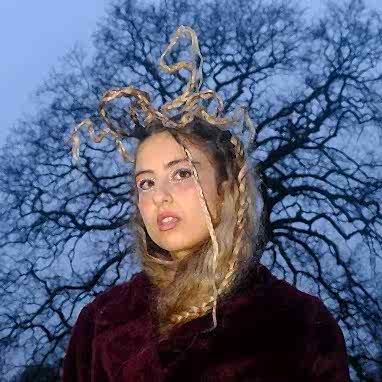
Carolina Saddi Cury
Research Pathway:
PhD Creative Practice: Music
Research Supervisors:
Dr Emilie Capulet
Dr Guy Harries
Research Title:
Sonic Gossip: Reimagining Feminist Rituals in Music
Research Topic Outline:
This research explores gossip within contemporary music culture, particularly across contemporary classical and pop. Once signifying friendly conversation and female intimacy, gossip was gradually redefined as malicious and trivial, reflecting the erosion of women’s status during the witch hunts. Drawing on Silvia Federici’s theories on women’s persecution—from early modern Europe to today’s capitalist societies—this project reimagines gossip as a site of resistance, reclaiming the authority of the female voice and body in musical performance and composition.
Through autoethnographic research and practice-as-research, this study integrates theory with creative experimentation. Gossip is explored as a creative strategy, incorporating informal conversations, social media interactions, and ritual processes through collective choir practices and sonic meditations.
By integrating piano, voice, electronics, and choral collaboration, aims to produce a body of work that challenges hierarchies of meaning and authorship in music. It positions gossip not as frivolous or destructive but as a feminist, communal, and deconstructive force, offering new ways to engage with music-making.
Biography
Carolina Cury is an Italian-Brazilian pianist, singer and composer. She trained at the Venice Conservatoire and later at Trinity Laban, where she earned a Master’s degree and Artist Diploma, and won the institution’s Gold Medal in 2021. Carolina’s distinctive artistic voice bridges classical, contemporary, and pop genres, with performances at prestigious venues such as London Coliseum and Carnegie Hall. In 2018, she released her debut solo album, Carnaval, and is preparing her second album for 2025, alongside Free & Equal Vol. 2, a collaboration with Studio Richter Mahr and Max Richter.

Zhu Sun
PhD Creative Practice: Music
Learn about Zhu Sun
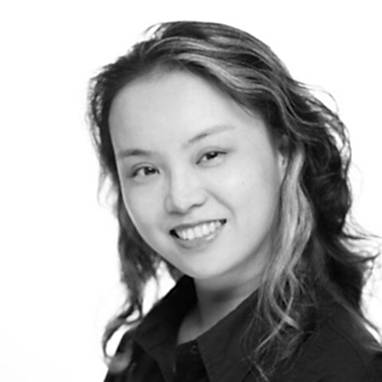
Zhu Sun
Research Pathway:
PhD Creative Practice: Music
Research Supervisors:
Professor Jonathan Clark
Dr Aleks Szram
Research Title:
Music, dance and metaphor: How can body movements and metaphors contribute to music interpretation?
Research Topic Outline:
This research was inspired by narrative ballets that are choreographed on existing classical music. It emerged from the need to be more effective with the use of language in teaching, because music is abstract and its perception is built around the use of metaphors and our imagination. Sadly, after years of training and getting used to this mindset, it is easy for us to forget that the ways we are used to describe or perceive music are all imagined, and this will cause miscommunication and confusion in teaching. This thesis aims to find a way in which individuals will be able to build their own metaphors suitable to their own or their students’ cognitive capability.
Biography
Zhu is a pianist working and researching in the field of dance accompaniment. She works regularly with dancers and coaches from the Royal Ballet and the English National Ballet, as well as the Place.

Hristo Ushev
PhD Creative Practice: Dance
Learn about Hristo Ushev
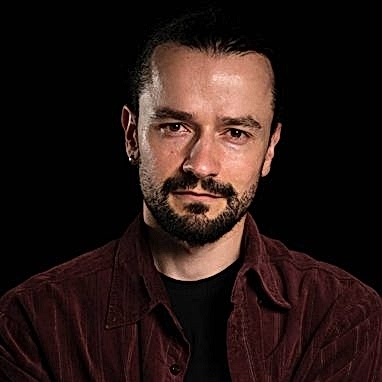
Hristo Ushev
Research Pathway:
PhD Creative Practice: Dance
Research Supervisors:
Professor Jonathan Clark
Dr Naomi Lefebvre Sell
Research Title:
Towards the Periphery of Consciousness
Research Topic Outline:
This Practice as Research project, as a creative endeavour in dance-making, is carried out in a cyclical model of rigorous theoretical investigation and processual collaborative studio-based movement experiments. Informed by the compatibility between the discipline of Authentic Movement and phenomenological methodologies, the primary focus of the study falls on the psychophysical processes recognised as occurring in the periphery of consciousness. The periphery of consciousness refers to an area within a person’s experience of which they are not directly aware. The psychophysical processes there are identified as not-conscious or not-yet-conscious. Through a phenomenological examination of the experiences of those involved in the movement experiments, the research suggests the development of a distinctive creative methodology for dance-making, based on phases of triggering, manifesting and creatively engaging with processes that have emerged in the periphery of consciousness.
Biography
Hristo is a Performer, Actor, Dance Artist, Director and Choreographer and graduate from the MFA Creative Practice Dance Professional Pathway at Trinity Laban.

Byron Wallen
PhD Creative Practice: Music
Learn about Byron Wallen
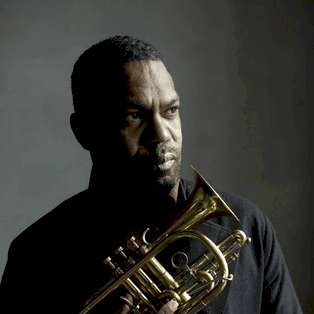
Byron Wallen
Research Pathway:
PhD Creative Practice: Music
Research Supervisors:
Professor Sam Hayden
Dr Bruno Heinen
Dr Hans Koller
Research Title:
The Confluence of Melody, Rhythm and Harmony: Investigating Circular and Linear concepts within large scale composition.
Research Topic Outline:
This research investigates the relationship between linearity, rhythm, space and polyphony, and presents a re-imagining of the music of Thelonious Monk within the context of Central African counterpoint. The research will present transcription and analysis of relevant repertoire, cross-disciplinary studies and collaborative work, a portfolio of recorded compositions and improvisations and a substantial commentary, detailing the compositional processes, and the theoretical underpinning of the works.
Biography
Byron Wallen (b. 1969) was raised in a musical family and as a child studied classical piano, euphonium, trumpet, flute, and drums. In the mid 1980s the trumpet became Wallen’s primary instrument of choice. Wallen’s first major work, Tarot Suite (1994), was inspired by a love of mythology and symbolism, which reflected the archetypal journey of human life through an interdisciplinary pan-continental approach.
Wallen’s study of cognitive psychology has aided his transition towards conceptualising music as a medium for healing. Wallen raises awareness and invokes change by unlocking boundaries through the nature and science of sound. Widely recognised as a seminal figure in Jazz, Wallen is an acclaimed writer and producer whose original scores have been commissioned by the Science Museum; PRS, The BBC, Jerwood Foundation, Southbank Centre, National Theatre, Arts Council, FIFA and Sage Gateshead. He has also composed soundscapes for Universal Pictures, Warner Bros and Game of Thrones.
Wallen’s PRS commission (2017) Anthem for Woolwich forges new links between schools, venues, musicians and residents to strengthen the resilience and promote the cohesion of the community. His commissions include a collaboration with Sheila Hill and Howard Skempton for Brighton Festival 2019 called Eye to Eye. Wallen has received the BBC Jazz Innovation award (2003) and has been nominated several times for the MOBO award. In 2017 he was awarded the Paul Hamlyn Award for Artists.

Gloria Yehilevsky
PhD Creative Practice: Music
Learn about Gloria Yehilevsky
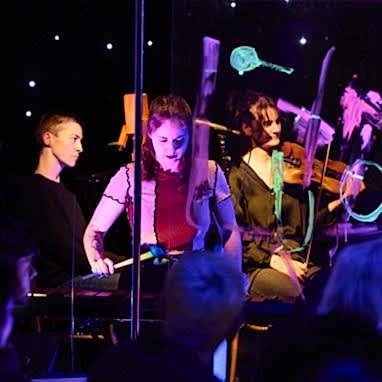
Gloria Yehilevsky
Research Pathway:
PhD Creative Practice: Music
Research Supervisors:
Professor Dominic Murcott
Dr Tom Challenger
Dr Hans Koller
Research Title:
Un/intentional improvisational-compositional realisations exploring cognitive sources
Research Topic Outline:
This thesis examines how unintended happenings in composed and performed music serve as creative fodder for subsequent composed and improvised materials. ‘Unintended happenings’ emerge from varying awarenesses of intentionality, drawing from a background in and memories of contemporary classical music, where intention and control were highly salient. This work reaches towards a new, re-examined, approach to creative music-making. It spans from a solo practice through the realm of social music-making, involving the audience in unusual and nontraditional ways. Methodologies include graphic scores, structured improvisation, and individual instrumental practice.
Generative works are focused on a more specific means of multi-agent collaboration, drawing from cognitive psychological and philosophical literature. Agents combine and restructure in unusual ways to create a heightened collective ‘knowing.’ Agents can be performers, composer(s), instruments, the score, the room, the setting, interpreters, the audience, and others. Information extends between agents and structures (the relations between agents, e.g. the traditional composer-performer hierarchy) are morphed. Resultant works demand their shared contribution towards an outcome unavailable through traditional composer-improviser-performer-instrument relations.
Biography
Named a ‘visionary’ by the San Diego Troubadour, Gloria Yehilevsky is a London-based improviser, composer, percussionist and researcher. Her practice centres on improvisation, flexible structures, and collaborative processes. Recent and upcoming appearances include Hundred Years Gallery, Serious’ Take Five, Moment’s Notice, and Sō Laboratories in NYC. Her performing accolades include winning the Italy PAS Vibraphone Competition and PAS/Armand Zildjian Percussion Scholarship, alongside appearances at MASS MoCA, Birmingham’s Symphony Hall and CBSO Centre, San Diego’s Rady Shell, and PASIC. She co-directed ‘Dreamerfly, and other stories,’ which was praised as ‘ethereal’ by The Guardian and received a Mid-Atlantic Arts USArtists International award.
Research & Knowledge Exchange
Discover more about our research areas, events and community.
